#but the cabby relevant things are all here I think!
Text
Cabby’s Gaps in Understanding
These scenes.
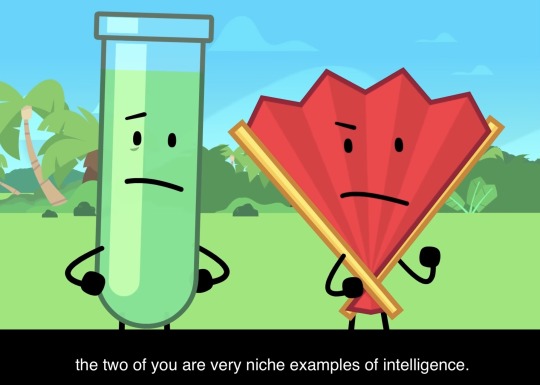


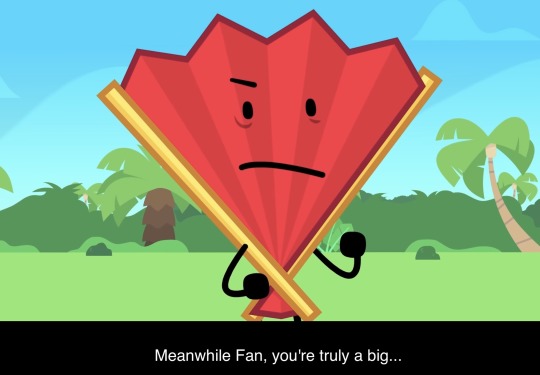


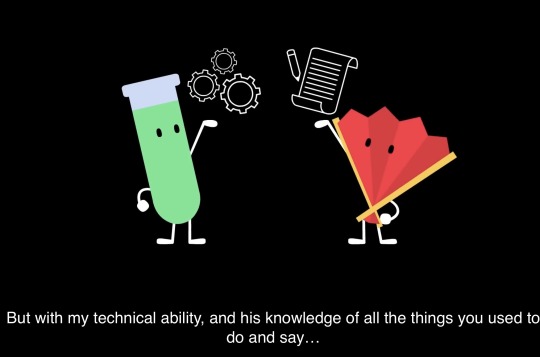
Are the parallels of all time. I think it was absolutely intentional that their ‘niche intelligences’ were explained in this exact order on these separate, very important occasions. Cabby thinks Test Tube and Fan are defined by these intelligences, and acknowledges that it was reductive to discredit Test Tube later on.
They’re stronger together and made a rash decision out of how much they care for each other. This results in TBD being made, and TBD’s existence is the one thing that stumps Cabby. Cabby cannot understand using all the potential behind combined strength to make an emotional decision. She doesn’t realize Fan and Test Tube doing this is a possibility, nor does she understand Test Tube throwing away that potential due to emotions brought out by the situation.
There’s an emotional reaction on her part to this too. She wants to experience this bond and combined strength very badly. She wants to believe she can experience it, even though it probably would not come naturally. Of course it wouldn’t, as though she regards it as ‘something warmer’, she also mentions how it’s ‘more subjective’. Considering how much of her image and sense of self is lauded as objective and factual, this is a big deal.
She’s so fascinating in that way, that what she clearly wants more than anything is the one thing that trips her up. She can categorize people all she wants into whatever boxes she can think of. But she can’t understand anyone not chasing the thing she desperately wants. Especially if they threw the potential away for a reason like Test Tube’s: because of emotions stirred up by the immediate circumstances. That’s an uncomfortable prospect for her, that unpredictability you have to trust as a part of yourself, since it’s what you really feel. That might be one of the most uncomfortable things for her full stop. She can’t understand stifling the potential to achieve something she desperately wants for that reason. But then we run into another problem, she doesn’t know how to openly discuss achieving that connection. It’s something she can’t even talk about comfortably without relying on someone else’s expression of feelings to draw from. Even when outlining a strategy with objective information, which is the definition of her comfort zone.
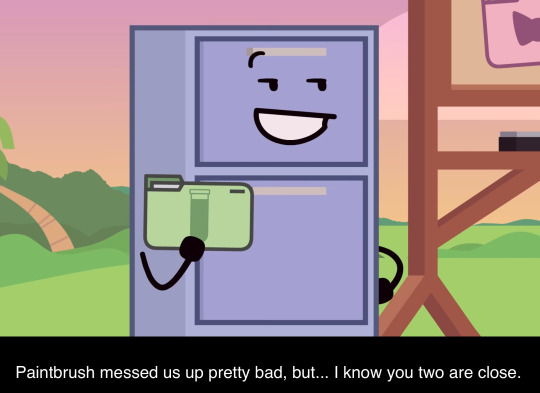
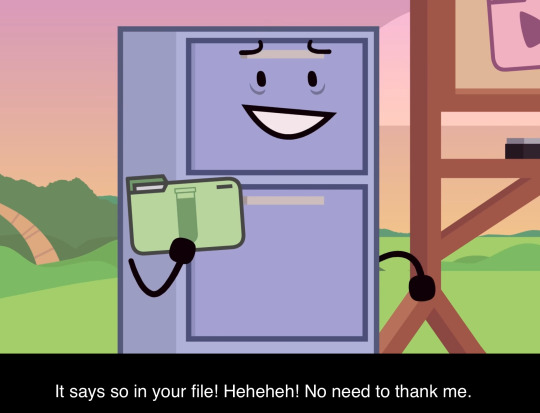
Now it’s caused a problem in her research, in her game plan. It’s gotten her eliminated and it’s gotten her nowhere with the biggest mystery/challenge to her database we’ve seen her tackle. But research has nothing to do with her goals, other than to be insurance that things never get too far off course. Though it is very telling that one of the clearest signs of her sense of lack is how it interferes with her research. How it interferes with her database, because the easiest way for her to realize a sense of lack in herself is through an extension of herself, right? Her files are that extension of herself.
This idea of her knowledge being all that she sees or presents herself as is not concrete yet. But consider everything else and her elaboration being “I am a piece, Test Tube is a piece, and our combined strength is—was… a piece.” There’s all this strategy and ‘sake of the game’ talk, but she’s really trying to reflect on the feelings brought out in both herself, Test Tube, and everyone else. She has to ‘evenly divide’ the moving parts of the situation in order to justify how she feels about it. She has to evenly divide people to understand them, she approaches the social aspect of the game in the way she knows how. She frames it like it only makes sense to do so, but deep down she puts so much of herself into her writing because she wants to understand others. “To understand them” is the reason she gives for making files on people. She could’ve elaborated if she wanted to… But she preferred to leave the reason unstated and move on. Before we can delve into that idea, we need to detail Cabby’s own understanding of herself first.
She more-so sees people as what they do, and their actions rather than who they are. Whether she views herself that way and then applied it to others or the other way around I don’t know. But she definitely makes a habit out of keeping track of peoples’ habits. She doesn’t just do it to pass time, she’s fascinated by it. She’s fascinated for the wrong reasons though, as a true logician fuelled by information would not be so comfortable with predictability. She’s not only comfortable with it, but depends on it to understand the whole set of said knowledge. This is all very similar to Fan, however she is far less inclined to include others’ emotion in her fascination or perception. In Cabby’s database, Clover can be a ‘sweet girl’ but she cannot be a ‘source of sweetness’ or ‘someone who makes me feel me sweetness.’ There’s no spontaneous action involved, only a type of person.
All this is to say: I think Cabby can understand certain emotions driving your actions, but those actions all have to be rational and controlled. She doesn’t understand emotions being a large part of the decision or action itself. This is what consistently trips her up. She can account for the base emotional state of people, but not what they’ll do when emotions that suddenly arise in them or change unpredictably are involved. What someone will do ‘under pressure.’ Not following the same patterns over and over. She can understand the patterns she sees, she can’t understand that everyone is a unique example of the ‘type of person’ she sees them as. I’d say this is where Cabby and Fan’s insular perspectives line up and then diverge again. Cabby plays with accurate information she’s perceived and that’s the fun part. Fan has fun with perceiving information without that close consideration to accuracy, since trivia is more of a decoration to him. For Cabby, she is a decoration to the trivia. She needs to perceive things objectively and accurately for her own pride, and she needs to preserve this information in order to put it to use. Because of course her understanding needs to be useful, to be helpful, otherwise she’d be doing it for the sake of knowledge. What she extra doesn’t understand is that if she’s doing this for own reasons, for pride or for a clear end result being a comfort, she’s already been making rash decisions fuelled by emotion. She’s making ill-advised decisions and *mistakes* by disregarding her own fallibility. There’s no way she can always keep up this image when that image has an emotional strain and her goals don’t take into account how to mend emotional struggles. The thing is, her emotional struggles or even her mistakes aren’t something she looks away from. She just doesn’t know what she’s looking at, or what she brings to the table that she would rather get from other people’s input. She doesn’t know it, nor can she begin to express it yet, but she has her own warmth inside her objectivity, she doesn’t need to gain that ability from someone else. She could win people over if she showed up as the ‘girl who puts herself into her database to calm herself and help others’ and not the ‘girl who cares more about her files than anyone, including herself, so imagine how she feels about *you*.’
The number one decision she needed to be making, is the kind of decision she can’t fathom someone else making. Acting upon a spontaneous desire to help someone, no matter if you have the perfect plan or even a plan that makes sense. Or, in the competition sense, helping people through their problem instead of keeping track of their problem just running its course. Looking out for the team in an honest and upfront way, instead of waiting for that perfect ally to come along and spark a change. This is especially unrealistic since a ‘perfect ally’ for her would have to be one that’s earned her respect and given her new insight. Cabby makes that very difficult to accomplish, in fact, she makes it harder every single time she seeks out information on her own.
But she could do so much good if she just realized that. She’s already done a lot of good without directly intending it. Cabby’s research is what gets Clover to question how she lives her life. She kickstarts Clover’s entire arc. Cabby’s research is also what helps TBD start looking for answers, and one of the things that let her know Test Tube was hiding something regarding those answers.
She overall needs to become more comfortable with spontaneity related to both emotions and information. If she were comfortable with that, then her needing ‘constant input from other people to feel alive’ wouldn’t result in her looking at people reductively. If she stopped looking at people reductively, she could see them more as ongoing projects, not instalments in the history of her perception. Then, finally, she could see that she herself is one of those ongoing projects that can be fulfilled by warmth and efforts to change for good. Not just reliability when things go wrong, but taking initiative in making things right.
Since she still just ‘wants to win people over’, she’s still figuring out what all the moving pieces are. The ‘why’ and ‘what’ she did wrong. But she wouldn’t have gotten to this point so easily if she didn’t care about how others felt. She cares that her mistakes hurt people, that’s why she’s reevaluating her thought process immediately after being shown that was the case. She wants to make things right, but she has to step out of her comfort zone to do it, and understand that ‘right’ changes in an instant from situation to situation, person to person. But she’s been shown her impact, and she readily accepts it once she stops clarifying her intent. That’s a great start. It’s the same start that Test Tube made once. I’m confident it’s the start of something better, considering the way she found out she was wrong is that she’s upset people outside of ‘the sake of the game’, that says a lot! It definitely couldn’t have been because her pride was damaged, since she was kind of really frantic and openly kinda pathetic while grasping at more answers during her last moments on the show. If only she knew the gap in her understanding that’s damaged her pride beyond caring for it is directly linked to the one damaging her growth. I would love to see these ideas linked again if Cabby and TBD are truly acquainted one day! Acquainted, or able to meet as friends who learn from each other, not as a mystery or problem to solve. That would be the perfect resolution to Test Tube realizing she made Cabby’s mistake before she could learn who TBD really was.
#inanimate insanity#ii cabby#you might notice that test tube and their alliance are exceptions to a lot of this… which is so sad#if they could talk or challenge each other more it wouldve been really great !!#but WOOOO CABBYPOST I HAVE NOT STOPPED THINKING ABOUT THE III2 AND III8 PARALLEL SINCE WATCHING III8 SO ITS. BEEN A BIT.#hope the cabbynetters enjoy and pls tell me what does or doesnt align with your interpretation =D!!#i have. tons more to say about test tubes mistakes and the tbd thing in general …#but the cabby relevant things are all here I think!#I ALSO BARELY TOUCHED ON TRUST. I WILL NEED MORE CABBYPOSTS TO GET INTO ALL THIS BUT BUT#if it involves test tube which it would.. I will need more test tube focused talking points#this one is mostly cabgirl enrichment#LANCING#also#long post
220 notes
·
View notes
Text
Strange Tales #132
Cover Date: May 1965
On-Sale Date: February 11, 1965

Doc gets a nice little panel on the cover this month. It's actually relevant to the story. We get a cameo from a returning villain, a cameo from a returning heroine, and a brief introduction to a character who will become a real pain in the rear. While this issue extends the chase from the previous issue, fortunately it ends here for the time being. It's definitely more than filler this month.
Doc has returned to the United States and Greenwich Village. Of course it's night and raining. Atmosphere is everything, after all! He gets out of a taxi near his Sanctum Sanctorum. I gather he has a reputation as the cabbie doesn't ask him if he should wait. Hiding in an alcove across the street, Doc goes ghost and enters his house. Who's waiting for him? The Demon from a few issues ago. Doc is distracted by The Demon dying his costume from that ugly olive green to a fetching purple. While distracted, The Demon senses Doc and sends out the Crimson Bands of Cyttorak. While the last time he conjured them they were some weird polyhedron looking thing, here they are blobby bands. Doc manages to escape by the skin of this ghost teeth and returns to his body.


As Doc broods about his next steps, we change scene to the Himalayas where Mordo's ninja ghost minions continue their search for Doc and the Ancient One. Conveniently for the old dude they miss the cave he's currently stored in. The Ancient One continuously babbles about "Eternity" while his retainer, the yet-to-be-named Hamir does his retaining.
Flying back to New York, Doc passes by a costume shop and a light bulb that isn't the All-Purpose Amulet flashes in his mind. Giving vibes of the short, fat sorcerer dude from two months ago, Doc goes to his house in disguise. His disguise is a hideous yellow and green abomination, but maybe that's what he was going for. He's upstairs and pounding on a door. Now let's think about this for a moment. While it's reasonable to think that Doc can get into his own house, he is in disguise and doesn't want to alert Mr. Demon. Why would he go in the house? Does Doc not only not have no mystic protections, but also leaves the front door open?
Doc confronts Mr. Demon and after threatening to go to the newspapers for some contrived idiocy, sucker punches him. Then he makes his big mistake and tries to use the Orb of Agamotto. The sucker won't open. It must be stuck! No, it's been enchanted. Mordo knows where he is! What now? Well, Dormie and Mordo have plans. We see Mordo with the stolen orb talking to Dormie on the magic floating, smoky flat panel TV.

Dormie charges up Mordo who departs for Doc's pad while Dormie waits for news of Doc's destruction. I really like the way Ditko drew his eyes all low and sinister.

Nearby, we see Clea and, through dialogue, her father, the yet-to-be-named Orini. Orini is a disciple of the dread one and tells his daughter he doesn't know what's going on and they'll have to wait and see. The passage of years will reveal that Orini isn't a nice old dude. Mordo arrives at Doc's pad and immediately starts to pummel Doc. There's a nice battle going on, but it's not as well drawn as the battle with The Demon in issue #128. Ditko manages to draw a similar magical construct for Doc, but it's less effective here.

Doc may be distracted trying to discover who is Mordo's charging station. Mordo is still cracking Doc's magic like it's nothing. The battle continues and Doc is about to hit Mordo with everything including the kitchen sink. Dormie grows bored, says "Freak it, I'm taking over!" Mordo starts talking in Dormie's voice. Doc says he recognizes it.


As Doc has this revelation, he disappears. My, oh my! What's next?!
This is definitely improvement over the previous installment. It's more than filler and we have some movement on the plot. While Doc appears to recognize Dormammu, when he finds out for certain in a couple of issues, he seems somewhat surprise, only suspecting it. Doc is pretty contemptuous of The Demon and doesn't even bother to zap him, just punch him. Doc is still pretty powerful, after all. Mordo is delightfully ruthless. He's beating the heck out of Doc and relishing every moment. It's a satisfying read. Next month we sidestep the main arc which is necessary in a story of this length.
#doctor strange#doctor strange reviews#strange tales#ancient one#clea#dormammu#baron mordo#demon#demonicus#orini
1 note
·
View note
Text
Chapter 33-Chapter 40
Chapter 33
So one of the people in the special council from Steris' chapter--Mari Hammondess--is in kahoots with the Set. Does this mean the other senators on the council are too? Is Adawathwyn the one being it all, manipulating the governor?
And enter Telsin?! I didn't expect to see her this early.
Chapter 34
Wayne is still unhappy with Telsin (which is putting it lighrlt) but I can't blame him.
This book is such a timecrunch. It takes place across a week or so, though mostly across a day or two? I suppose I'll have to continue reading to figure that out.
And end of part two.
Chapter 35
Okay, I do love the 'I'm saving the world because I live here". It's always a fun thing.
It's interesting that Tlesin is spouting the same stuff about innovation that Harmony himself talked about previously.
I think I already talked about this, but I wonder if maybe the bomb is going to have two objectives. The first would be, of course, destroying Elendel. The second, I think has something to do with the effect harmonium has on allomamcer abilities? I'm still thinking it either enhances allomantic powers or maybe gives people them.
Hey a Whimsy mention!
Chapter 36
Put of course the cabbie is also a Ghostblood.
Wait, does this confirm Kelsier is Shai's mentor?
Chapter 37
I'm happy to know there are bagels on Scadrial.
Is part of this story going to be Wax (and Wayne) avoiding Hoid and his helpful car? I kinda love that.
Chapter 38
I love Steris. That lady knows how to problem solve.
""Everyone shut up and listen!' Steris snapped. "Or I will barf kn the table to get your attention!'
The entire room stared at her.
'I'll do it,' she warned. 'I keep medication in my handbag to produce the effect. You'd be surprised at how often the option is relevant.'
Well, now she had their attention." Iconic.
TenSoon!!!
Chapter 39
Okay, so they were saying Kelsier is Shai's mentor.
Oh a new character! Or maybe Codenames Are Stupid is also someone we've met before. Also, is it just me, or are there more women mentioned in this book? I don't know if I'm just noticing everytime a women is mentioned or if Sanderson actually put more women in the background of the book.
I wonder if TwinsSoul is from Roshar (maybe a spren) because of the way he was described. He kinda reminds me of a Cultivationspren due to the crystal growths on his skin.
Oh. Okay. So Codenames is someone we know. She's really jut going to be thrown in the book like that? Wait, the language denial makes sense.
Oh my god we're getting Kelsier!
Chapter 40
It's a seon!
Nevermind, TwinSoul has something to do with the aether.
We have some Nalathis magic going on with those identitiy locks, so that's cool.
Also, before these last two chapters, I thought someone could still read the book and miss the connections without it impacting anything. But now... Yeah, no. I don't know if people agree, but you can read RoW without having read other books. This one, I imagine it would be very difficult at best to read it only having read the Mistborn series.
I have theity-two chapters left plus the epilogue. I'm hoping to finish this today or Friday, though Friday seems like the likelier possibility because I have stuff to do. Wish me luck.
1 note
·
View note
Text
Ships and Cars - The Sign of Code
There have been lots of discussions about code in BBC Sherlock, and the possible metaphorical meaning of different things that appear frequently in the show, such as coffee/tea, water/fire, dogs/cats and many more. This show indeed seems filled with ciphers, code and secret messages. In this meta (X) I tried to decipher the encrypted name of the fishing boat that Sherlock and John hijacked in TFP, when it was called upon from Sherrinford: “Golf-Whisky-X-ray”.
The Ship coding
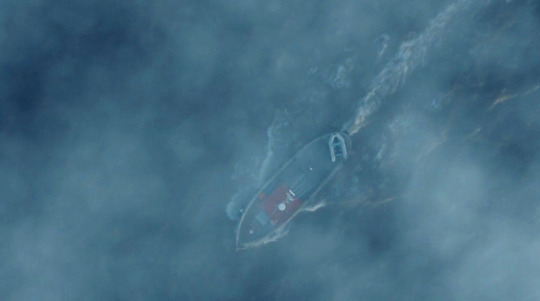
At first I thought this was referring to the international spelling alphabet for wireless communication (X, X) where there’s a word for each letter. “GWX” didn’t make much sense to me, though, until I stumbled upon something deeper: ‘Golf’, ‘Whisky’ and ‘X-ray’ are also part of the marine Code of Signals (X) that was established in Britain around 1850. It’s still used by water vessels to communicate important messages regarding safety of navigation and such, and the signals can be sent by, for example, flaghoist, signal lamp or flag semaphore. Conan Doyle worked on a ship at least in 1880 and 1881, so the signals could totally have been known to him already in Victorian times. And since Sherlock and John are on board a boat in TFP,
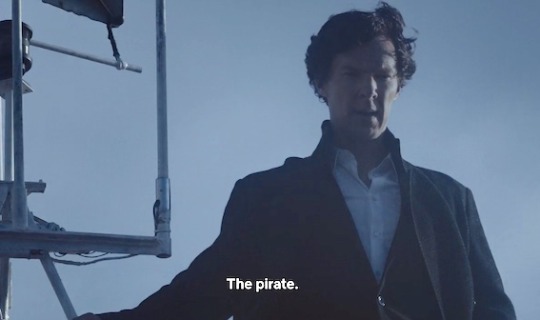
I think it’s reasonable to assume that the marine code is the relevant one here. In this signal code, the flags for “Golf”, Whisky” and “Xray” mean the following:
Golf = “I require a pilot.”

Whiskey = “I require medical assistance.”

”Xray = “Stop carrying out your intentions and watch for my signals.”

Which in other words could be read as:
I need a pilot (a maritime pilot to help me navigate)
I need a doctor
Pay attention to code
But is this use of marine signals something that only appears in BBC Sherlock? Is it Mofftiss’ own idea to use them, or could there possibly be any canon references to them? In the discussion that followed my meta (X) @frailtyofgenius pointed out to me that ACD’s canon actually does mention “Naval signals” in His Last Bow (LAST), which I think might be very significant. And the one who uses the naval signals is Holmes himself.
Continued under the cut, because this is reeeally a long ‘transport’... ;)
So I took to read LAST and realized that there are several ’naval’ references (my bolding) in this story by Conan Doyle. In the beginning, as a romantic landscape framework, we’re told about the surroundings of the German spy Von Bork’s house:
Above, the stars were shining brightly, and below, the lights of the shipping glimmered in the bay.
LAST takes place on the English east cost, near the port of Harwich. The spy Von Bork is chatting with Baron Von Herling, a German diplomat, bragging about the intelligence he’s gathered for his country, and then he shows the Baron the contents of his safe:
And all in four years, Baron. Not such a bad show for the hard-drinking, hard-riding country squire. But the gem of my collection is coming and there is the setting all ready for it.” He pointed to a space over which “Naval Signals” was printed.
But apparently the naval authorities have changed the code:
“But you have a good dossier there already.”
“Out of date and waste paper. The Admiralty in some way got the alarm and every code has been changed.”
So Holmes, posing as the Irish-American spy Altamont, is supposed to bring new ones. I think the real ‘feature of interest’ in this story, however, is the coding that Holmes/Altamont uses in his telegram to the German spy:
“Will come without fail to-night and bring new sparking plugs.
ALTAMONT.”
And the conversation between Van Bork and the Baron continues:
“Sparking plugs, eh?”
“You see he poses as a motor expert and I keep a full garage. In our code everything likely to come up is named after some spare part. If he talks of a radiator it is a battleship, of an oil pump a cruiser, and so on. Sparking plugs are naval signals.”
So here in ACD canon we’re explicitly told that the spark plugs, the ignition of the car’s engine (which generates an explosion in the engine’s combustion chamber) actually represents code - marine code. And other car references, according to Van Bork, are also marine code. I can’t help wondering if water was actually meant to represent emotions already in canon? ACD canon is packed with references to water: sea, coast, lakes, ponds, rivers and waterfalls but also ships, steamers, boats, submarines and such. Some of the criminals in canon are seamen and the navy is mentioned in some cases. And in two stories (NAVA and BRUC) the ‘naval’ issues contain secrets of national importance.
I’d love to try to analyse all the water and boat references in ACD canon and see if/how they tie into emotions, but that’s for another meta. :) But what if something similar is done in BBC Sherlock; what if Mofftiss have used not only canon’s water metaphors for emotions but also the same general secret cipher as Holmes used in LAST? But maybe Mofftiss also took the cipher one step further, interpreting anything car-related not as general metaphors for emotions, but specifically as code for sexuality.
In TFP there’s a great explosion at 221B, and next thing we know, Sherlock and John are aboard a fishing boat, which is called upon with naval signals. But there’s actually very few ships in BBC Sherlock (while canon, as mentioned, is full of them); the fishing boat in TFP is one of very few boats in the show. As for seamen, there’s also very few in the show. Except for the fishing father and son in TFP, there’a also Sherlock’s deductions about the unemployed fisherman and his mother in THoB. @sagestreet has written an excellent meta suggesting a significant symbolic meaning of ‘fishing’ in this case (X).
In this self-censored post on John’s blog, however, there’s a cruiser mentioned in the title: Tilly Briggs Cruise of Terror. But we never get to know anything about this case; the post is taken down entirely since, according to John, “the ship’s owners are launching an appeal”.
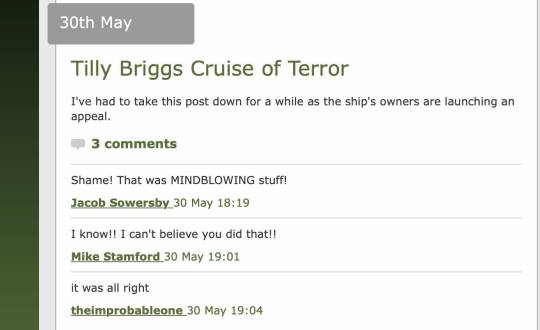
Why is this post even there, if no one is allowed to read it? Every other blog post from John has some kind of content in it - at least since he met Sherlock. But this one only has a title (and a teaser in the post before: “I'm going to tell you about a couple of the smaller cases we've been involved in. What really happened on the Tilly Briggs pleasure cruise.” (X))
So the supposed ‘pleasure cruise’ was turned into a ‘cruise of terror’ and then deleted. Maybe it’s just me, but I strongly suspect this is a clue from the show makers telling us that a certain ‘ship’ is not allowed in BBC Sherlock, for ‘legal’ reasons having to do with the ‘owners of the ship’ (ACD Estate).
Actually, there’s more info than this about the ship even in ACD canon, although it’s scarce. In The Sussex Vampire (SUSS) “Matilda Briggs” is mentioned in a letter to Holmes from the company Morrison, Morrison, and Dodd:
“As our firm specializes entirely upon the assessment of machinery the matter hardly comes within our purview, and we have therefore recommended Mr. Ferguson to call upon you and lay the matter before you. We have not forgotten your successful action in the case of Matilda Briggs.”
After Watson has read it, Holmes explains to him (my bolding):
“Matilda Briggs was not the name of a young woman, Watson,” said Holmes in a reminiscent voice. “It was a ship which is associated with the giant rat of Sumatra, a story for which the world is not yet prepared.”
If this is an allusion to a possible relationship between Holmes and Watson, indeed the world would not have been ‘prepared’ in Victorian times, since homophobia was prevalent and same-sex couples illegal.
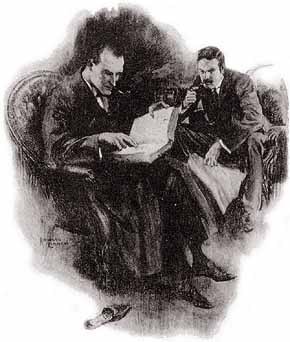
Source: (X)
Directly after this, while perusing his lexicon for ‘Vampires’ (the actual topic of the letter), Holmes also mentions another ship that was associated with Victor Trevor’s father’s secret past as a mutinous convict:
“Voyage of the Gloria Scott,” he read. “That was a bad business. I have some recollection that you made a record of it, Watson, though I was unable to congratulate you upon the result.”
Indeed this voyage in GLOR was a ‘bad business’; it ended in mutiny and disaster. The ship Gloria Scott exploded and sunk in the Atlantic, and most of the crew and passengers died.
So, not many ships appear in BBC Sherlock. But instead, there’s plenty of cars in the show. What if all these car references actually somehow actually refer to a ship - a very particular ‘shipping’? ;)
The Cars
So, might these cars code for some hidden secrets? And/or is it possible to tie the car references to ’naval code’, as Holmes claims to do in LAST, assuming that naval = water = emotions but also sexuality?
Returning to canon, please note that Holmes and Watson (both in disguise) arrive in a car to the scene of this story in LAST. This is one of the very few cars that appear in canon, since they weren’t yet very commonly in use by those times. Holmes’ and Watson’s car is modestly described as “a small car” and “a little Ford” (as opposed to Baron Von Herling’s car, which is a huge limo). But at the end of the story, Holmes says about the little Ford: “Start her up, Watson, for it’s time that we were on our way.” And there they go, happily together, with the criminal tied up in the back seat, heading for Scotland Yard. Sweet, isn’t it? :) This is the very last we see of Holmes and Watson in canon. (Unfortunately, I can’t find any illustration of it).
BBC Sherlock, however, is full of cars. So, if we apply this analogy to BBC Sherlock, what car references can we find that could be translated into marine (= emotional) terms? Well, the first thing that comes to mind is the cab, the taxi, which is Sherlock’s preferred means of transport.

A taxi has a driver, which is the word that the little girl on the plane in TFP uses instead of ‘pilot’. But we don’t see any taxi boats in the show, do we? In the Unaired Pilot, however, the cabbie drives Sherlock home to Baker Street (not to Roland Kerr’s), and there he tries to ‘kill’ him. One could even assume he makes a kind of sexual innuendo when Sherlock is sprawled face-down on the floor and the cabbie says “I could do anything I wanted to you right now, Mr ’olmes.”
As I explained in my other meta about marine code (X), a marine pilot is someone who leads a ship through dangerous waters. Mofftiss haven’t included any marine pilots in their show, but they do use aircraft pilots, even if they’re not labelled as such:
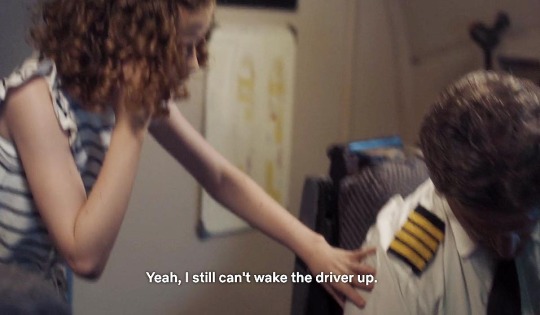
But if ‘driver’ should be read as ‘pilot’, then Jeff Hope - a John mirror - in the Unaired Pilot, the ‘driver’ of the show, guides Sherlock home emotionally and sexually, doesn’t he? ;)
But there’s more about the signals in LAST. This is what the counter-agent Sherlock ‘Altamont’ Holmes says when he arrives at Von Bork’s place:
“You can give me the glad hand to-night, mister,” he cried. “I’m bringing home the bacon at last.” “The signals?” “Same as I said in my cable. Every last one of them, semaphore, lamp code, Marconi – a copy, mind you, not the original. That was too dangerous.”
This seems very similar to Wikipedia’s explanation of the Marine Code of Signals, as I quoted above: apart from flag hoist, the signals can also be transmitted by, for example, flag semaphores, radio communication or signal lamps. We do have radio communication in TFP, when Sherrinford receives the message from the boat ‘golf-whisky-x-ray’. But are there any signal lamps in BBC Sherlock? Yes, in fact there are - and they’re tied to a car!
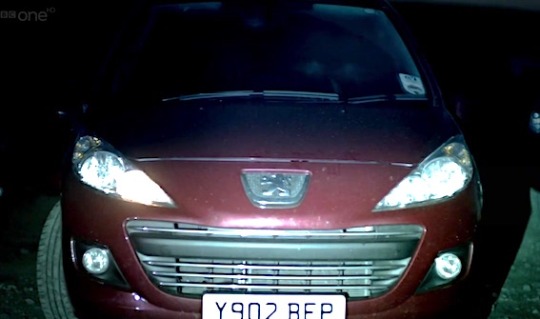
A blinking, grinning Peugeot, no less, in THoB. And it’s definitely connected to sex, because that’s what’s happening inside. ;) Even if we’re lead to believe that this isn’t actually code, John does try (unsuccessfully) to decipher the blinking lights from this car as Morse signals and gets “U M Q R A”.
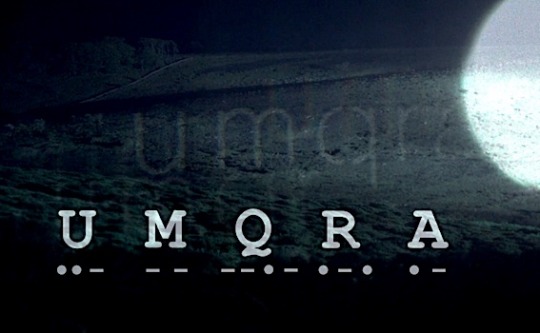
Apparently this code is not referring to the Marine Code of Signals. But @bug-catcher-in-viridian-forest has written an excellent meta (X) deciphering the possible code “UMQRA” as meaning “TORCH”, using the Ceasar cipher, which Sherlock refers to on his website (X) in combination with another cipher. In my opinion this does make a lot of sense. John does indeed use a torch to try to decipher this message, and there are also lots of other possible metaphorical meanings of ‘torch’ in the show.
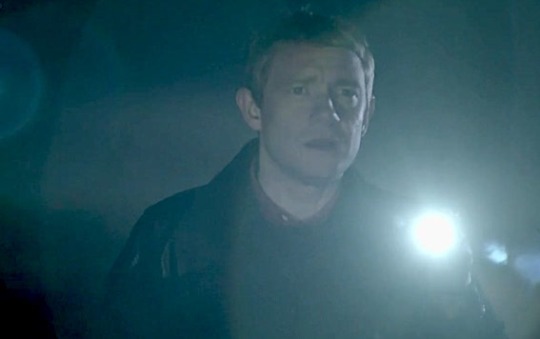
So I think it would still be wise to pay attention to code, wouldn’t it?
As for Holmes’ quote from LAST above, “a copy, mind you, not the original”, I’d interpret this at Holmes pointing out that these signals can be copied (’mirrored’?) and also that they can vary in type (I imagine that ‘Marconi’ stands for radio transmission (X)). All in all, these naval signals are of national importance in canon, just like the Bruce Partington Plans and the Naval Treaty. And these are all military top-secrets clearly connected to the British navy. At some point in LAST, believing he has won the spy game, the Baron says:“There may be other lights within the week, and the English coast a less tranquil place!” Seems like the East Wind is coming. ;)
But back to the marine codes and cars: in canon (LAST) the car references hide secrets of national importance, connected to Britain’s naval defense, and some of those secrets, in turn, are encrypted with naval signals. That’s double coding, right? Also: the navy defend British waters and water = emotions.
As for cars, there’s a lot more of them in the show, while canon has very few; cars weren’t in use during most of Holmes’ career. I think LAST is the first time that cars appear in ACD canon? And the spare parts that Holmes/Altamont talks about as code in LAST never actually appear in the story, only the Baron’s limo and Holmes’ little Ford, where Watson is the driver.
But in the modern show there’s plenty of cars, of course; they’re literally everywhere. Many people have long ago pointed out that cars represent transport metaphorically, which is how Sherlock views his bodily needs in the unaired Pilot. Which ties in well with the assumption above that cars also represents sexuality, which is related to emotions even if it’s not the same thing.
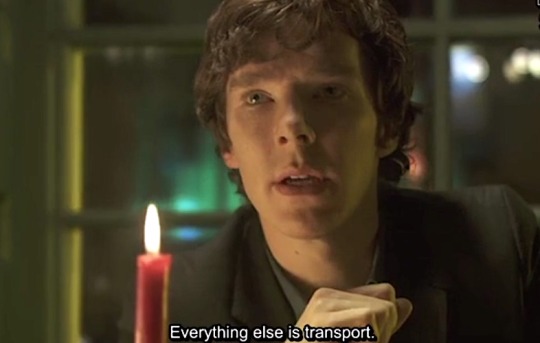
But let’s also try to decipher the car references with Holmes’s code in LAST in mind, shall we? Where can we find water and/or possible hints about emotions and/or sexuality?
Apart from the taxis, which run like a red thread through the episodes (ASiP, TBB, TGG, ASiB, TRF, HLV, TST), and the abundance of police cars and ambulances, I can think of the following:
Mycroft’s black governmental car which is used to kidnap John in ASiP (and other episodes).
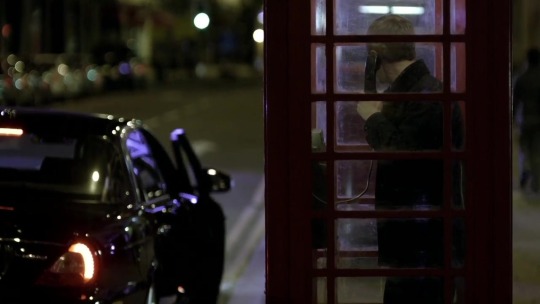
If Mycroft represents Sherlock’s brain, this might be about Sherlock trying to examine and test John with his intellect, to get an idea of who John is and what to expect from him. But this task is driven by his car - bodily needs - and behind them there’s still emotions, if we apply Sherlock’s code in LAST.
The first hostage’s car in TGG, where she is wrapped up in semtex.
This woman is literally trapped inside her car and metaphorically trapped inside her bodily needs, which are threatening to explode (remember Holmes’ ’sparking plugs’ in LAST?) if Sherlock doesn’t solve the puzzle about Carl Powers. And in this screen cap she is literally juxtaposed to Sherlock:
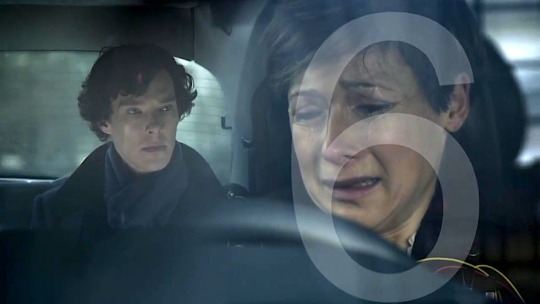
So it seems like Sherlock is now trapped inside his ‘transport’, yes? Still driven by emotions rather than intellect. And he probably sees this as very dangerous.
The finding of The ’dead’ man’s car with (fake) blood in TGG.
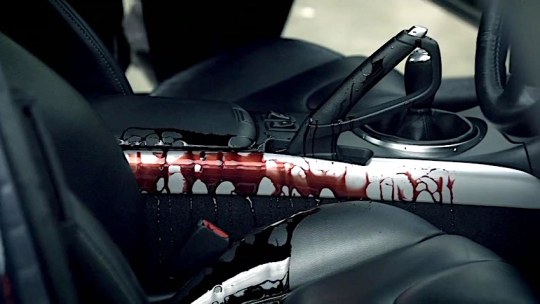
This ill-treated transport device (John calls it ”an abandoned sports car” on his blog X) leeds to more cars - Janus cars - and it turns out that the driver - Ian Monkford - isn’t dead; he’s just on ’vacation’ in Colombia (with the real purpose of cashing in his life insurance money). Sherlock figures this puzzle out and the poor fellow wrapped in semtex can breathe out; he’s not going to explode, either physically or emotionally. And no-one is dead in this case, but the driver faked his own death to avoid exposure and get his ‘security’.
The car with a dead body in the boot in ASiB
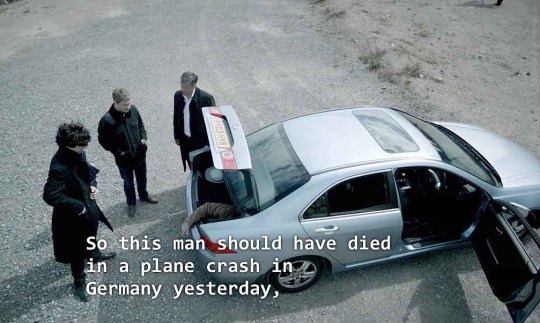
Licence plate: PYO3 HYN. The dead man in this car was destined for Germany according to his tickets - another ‘vacation’? But he never reached there; his plane crashed but he wasn’t in it, because he was already dead - trapped in his transport a car. Now, this case seems intimately connected with Sherlock in the boot of Mrs Hudson’s Aston Martin in TLD (see below). Except that Sherlock was being transported alive in that boot, but this guy is dead.
The client’s back-firing old SAAB in ASiB
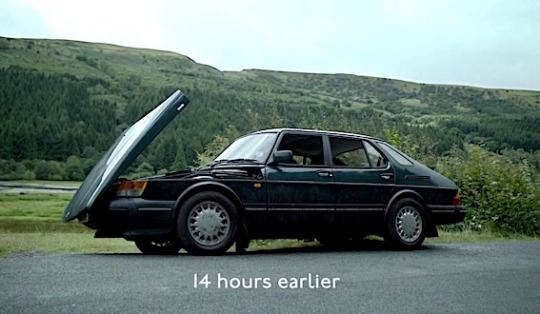
The client stops near a wetland area and a stream because of problems with his engine. The driver - a John mirror? - tries to fix his ‘engine’, but the old car just won’t start. Sherlock analyses this case in his (drugged) Mind Palace together with his libido Irene Adler.
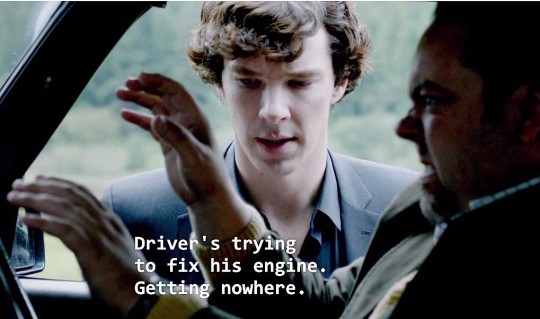
People have pointed out long ago (sorry for not remembering who - was it LSiT?) that the back-firing SAAB engine in the hiker case in ASiB might represent John’s dysfunctional sexlife with women; Sarah in specific and probably their trip to New Zeeland after TGG. (Maybe this is also why Sherlock in TSoT, when John has just been married to Mary, deduces that one of the wedding guests - a doctor - has ‘erectile dysfunction’?)
Irene’s black car in ASiB
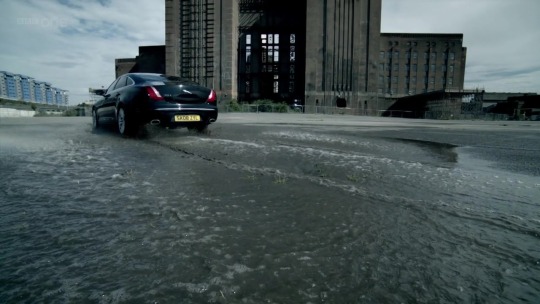
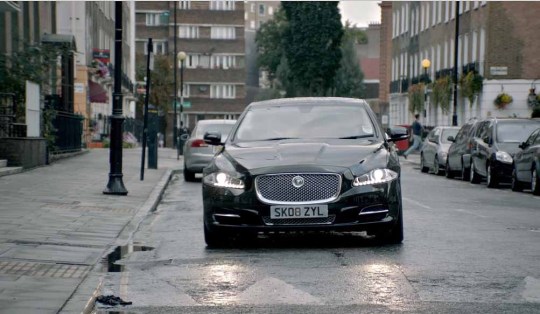
Licence plate: SKO8 ZYL. This black car, which has a private driver, is used to transport John to the Battersea station on New Year’s Eve in ASiB. In spite of being in midwinter, Battersea seems to be flooded with water. And this is the place where Irene exposes John’s sexual relationship with (or at least interest in) Sherlock while Sherlock is listening to the conversation from another room, but John declares that “I’m not actually gay”. This car is so similar to Mycroft’s black car (see above) that John thinks this is Mycroft who kidnaps him again. If Irene represents Sherlock’s libido, what does her black car stand for?
Sherlock’s and John’s hired Land Rover in THoB

Licence plate: OEI0 HFK. The Land Rover is a British car, known for its four-wheel drive and vast off-road capacity. Sherlock drives this car to “deepest, darkest Devon” with John in the passenger seat, so it seems like they were prepared for a ‘bumpy ride’. And this car actually has a visible spare part; an extra wheel in case of emergency:

And their journey really became ‘bumpy’ - at least on an emotional level, since they were both dosed with a fear-inducing gas, had a quarrel, and the gay couple who were running the Inn where they were staying took for granted that they were indeed a couple too.
John’s and Mary’s car in HLV and in TST
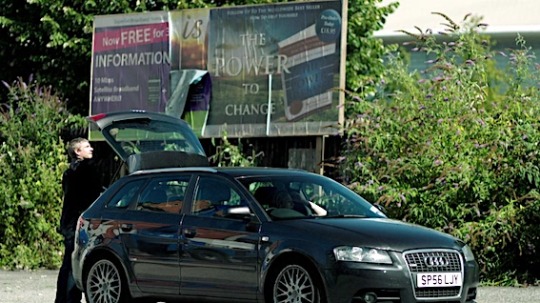
Licence plate: SP56 LJY, black Audi. Mary is the driver in HLV. (By the way, why has this car the steering wheel to the left, in a country with left-hand traffic?). Here we’re presented with the interesting idea from the billboard that “Information is the power to change 1895″. In HLV we actually do see something like a spare part for this car; John’s tyre lever. ;) (which looks more like some sort of pipe key, if you ask me, but whatever; it’s still a spare part - or at least a ‘tool’ - associated with John’s transport car):
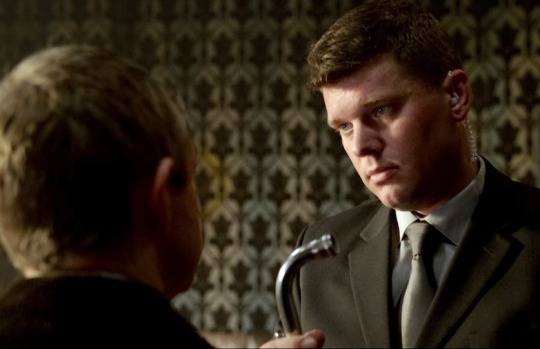
So this would be consistent with Holmes’ cipher in LAST. And this spare part is treated with very sexual overtones in HLV, so I think the influence of Sentiment and Sex is pretty clear here.
Mrs Hudson’s red Aston Martin in TLD

License plate: APIS CXJ. Now, this is a really interesting and beautiful car I think, and it shows its capacity when it goes speeding in TLD. Mrs Hudson has more resources than some people might believe. But John is only allowed to use her sports car - the ultimate symbol of male virility - when he’s off to rescue Sherlock. ;)
The license plate reads APIS, which I’m sure is a reference to bees and bee keeping, because Apis mellifera is the scientific name of the honey bee. Holmes’ main occupation as retired in ACD canon is bee keeping, which is shown in LAST, where his secret ‘sparking plugs’ turn out to be the Practical Handbook of Bee Culture. ;)) So Holmes stood by his words in his telegram to Van Bork; he did “come without fail to-night” (he came together with Watson) and he did “bring new sparking plugs”. It’s just that the ‘spark’ wasn’t maybe of the sort that Van Bork had expected...
Anyway, in this scene in TLD, Sherlock is being kidnapped and handcuffed by Mrs Hudson and transported in the boot of that sports car; he’s literally trapped inside the rear end of his transport, which has John as its direct destination.
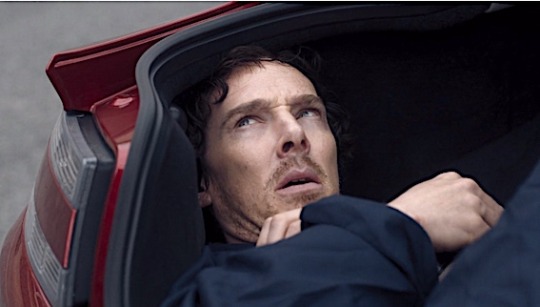
Sadly for all of us, however, John refuses to ‘examine this body’, and this is instead done by the John mirror Molly (inside an ambulance), who tells Sherlock that he’s dying and that “it’s not a game”.
The next time we see this red sports car, however, John is the driver, and he’s using its great capacity as it should be used: to come to Sherlock’s rescue. ;)
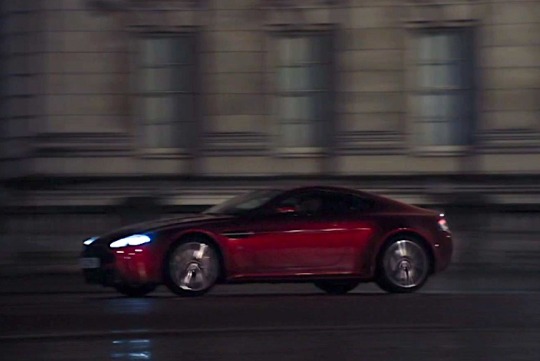
Come to think of it, there’s actually at least one more car spare part mentioned in the show, even if it might not be meant as this specific part:
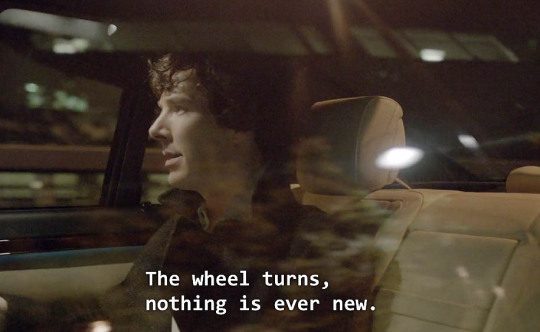
This car has a steering wheel nevertheless, and Sherlock is sitting in the car while saying this. And yes; this show is indeed repetitive when it comes to certain topics. Like ‘transport’, emotions and bodily needs. But I do hope we’ll finally see some new turns on this topic in the next series. ;)
Thanks for your patience in following this marathon meta to its end! Tagging some people who might be interested (please alert me if you don’t want to be tagged):
@raggedyblue @ebaeschnbliah @gosherlocked @sarahthecoat @lukessense @therealsaintscully @thewatsonbeekeepers @sagestreet @tjlcisthenewsexy @thepersianslipper @loveismyrevolution @shylockgnomes @frailtyofgenius
Screencaps in this meta are in some cases borrowed from this site (X).
95 notes
·
View notes
Text
Lin-Manuel Miranda interview: from Hamilton to His Dark Materials
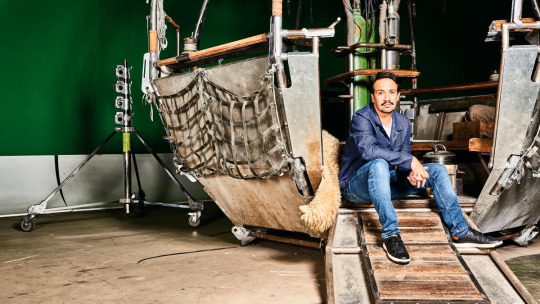
I know Hamilton remains wildly popular more than four years after it premiered on Broadway because of the intense response to my Instagram post boasting I have tickets to watch it the evening before meeting its creator, Lin-Manuel Miranda. "It's one of my absolute favourite things in the world ever!" raves one correspondent. "It's WONDERFUL and I defy you not to download the soundtrack afterwards," adds another. "I went last night! Second time. You're gonna love it."
The problem, however, is that I'm not sure I will love it. When theatre is great, it's the best thing on the planet, but when it is bad, as I have learnt from the bitter experience of watching three-hour open-air adaptations of Dickens' novels, it is the worst. Musicals are especially challenging: in my experience, you either like them or you don't, and given one of the few I have enjoyed was Avenue Q, which subverted the form, I'm in the latter camp.
Then, on top of this, there is the pressure of hype (and Hamilton has been more hyped than anything this side of the moon landings), and the challenge of taking hip-hop, which I love, out of an urban setting. It can easily go a bit Wham Rap!, or even worse, if you've seen the video, Michael Gove performing Wham Rap!.
It is, however, pretty good. The last thing the world needs is another long review of Hamilton, and I can't say I downloaded the soundtrack afterwards or that I didn't look at my watch occasionally, but using rap to retell the dry story of the founding fathers is inspired, and I'm so relieved that I blurt out my review to the 39-year-old writer and performer when I meet him in a restaurant in Fitzrovia. "I do find that with both Hamilton and In the Heights, my first show," responds the award-winning composer, lyricist and actor, "I get a lot of people who say to me, 'I don't really like musicals, but I loved this.' I attribute that to a very simple thing: my wife, who doesn't really like musicals. She didn't grow up going to see them, or doing theatre. She's a lawyer; when we met, she was a scientist. I have a higher bar to clear than most composers, because my first audience is my wife, and it can't just be a pretty tune."
You might recognise his wife, Vanessa Nadal, whom he met at high school, from the video of the couple's wedding reception in 2010, which like everything Miranda touches, went viral, and shows him performing the Fiddler on the Roof song To Life to his beloved.
Even my withered heart may have been momentarily lifted by it. She has accompanied her husband with their two young sons, aged one and four, to Britain, where he is filming a part in the BBC's slick new adaptation of Philip Pullman's His Dark Materials, though the reason he is in London today is that he has just been the subject of an episode of Desert Island Discs. The New Yorker takes a takes a swig of his coffee, which he tells me he chose as his luxury on his island ("I'm so basic"), adjusts his yellow baseball cap and asks me a question about the unsolicited review: "Why did you feel the need to say it?" There follows the most painful recording I've ever had to listen back to, as I make a bunch of ludicrous generalisations about musicals, speculating that perhaps they divide men from women, or the working classes from the middle classes, or straight people from gay people, or white people from brown people. It only strikes me a few minutes in that not only is Miranda living proof that the generalisations are nonsense, but I am essentially explaining musicals to a world expert in the form - a man who, before the age of 40, has a Pulitzer prize, three Tony awards, three Grammys, an Emmy, a MacArthur Fellowship, a Kennedy Center Honor, two Olivier awards, one Academy award nomination and two Golden Globe nominations to his name.
"Where do you want to start?" he responds with what is, in retrospect, startling patience. "You brought in all this cultural baggage and you're laying it at my feet and I don't know which bag to open." Another swig of coffee. "I think with musicals, it has to do with the way in which you interact with music in your own life. I grew up in a culture where dancing and singing at weddings was supercommon. So, if that's corny to you growing up, or you're taught to believe that's corny or unbelievable, then of course you're not going to like musicals."
...
He spent much of those years doing a bunch of badly paid, disparate jobs, which, given his nature, he nevertheless enjoyed. They included working as an English teacher at his former high school. ("I loved my curriculum. The class was exhilarating once I realised the less I talked, the more they learnt. I saw a future in which I taught at my old high school for 30 years and was very happy.") He wrote for a local paper as a columnist and restaurant reviewer. ("What kind of restaurant reviewer was I? Not very discriminating. If a new restaurant opened, I would go and eat some stuff and say, 'Hey, we have a Thai restaurant. I get to eat first at it. This is great!' ") And he made guest appearances on a number of TV shows including The Sopranos and House. What kind of roles was he being offered at the time? "I wasn't getting any roles! I was always the Latino friend of the white guy in the lead. And so centring ourselves in the drama, telling our own stories, is a big part of In the Heights, my first musical."
An unexpected thing about meeting Miranda is how instinctively he turns to the topic of his first musical, In the Heights, rather than Hamilton - not least when he talks about how he spent one month each year as a child with his grandparents in Vega Alta, Puerto Rico, and was inspired by the gap between his worlds. "In Puerto Rico we were doctors and lawyers. And we're cabbies in New York; we're for the most part the poorer segment of society, and on TV we were always thieves and we were always the Sharks. In the Heights was a response to that. It was, 'Are we allowed to be on stage without having a knife in our hands?' " But then he has spent part of the summer filming a movie version of that musical, which is set over the course of three days, involving characters in the largely Hispanic-American neighbourhood. It is also the project that changed his life most dramatically. The more recent success of Hamilton rather eclipses the fact that his first show, which he began writing in the late Nineties when he was still a student at Wesleyan University, Connecticut, was also wildly successful. After success off-Broadway, the musical went to Broadway, opening in March 2008 and ending up being nominated for 13 Tony awards, winning four, including best musical and best original score.
...
Miranda, described as "a fantasy of the Obama era", has since been active in politics, lobbying and fundraising for Puerto Rico and performing with Ben Platt at the March for Our Lives anti-gun-violence rally in Washington DC on March 24, 2018. Does he feel demoralised by the drift of politics to the far right? "The thing about us all being connected online is that you can read all of the worst news from all over the world and be overwhelmed. You can't let it all in; just act on what you can act on." Should Trump be ignored or fought every step of the way? "It's hard to even discuss it, right, because Trump will have outraged us on two new things in the next [few hours], as soon as he wakes up, and it won't be relevant by the time we're having this conversation. And the same with Brexit, which is just as uncertain."
What did he make of Trump's revival of the phrase "Get back to where you came from" in relation to Democrat politicians? "It's unacceptable. Just because he said it doesn't mean it's acceptable." He leans back in his seat. "Here's my fear of getting into this with you: every time I've done a UK interview, I've said incredible shit and Trump's always the headline, even if I've only said two lines about it. So I'm happy to talk about it, but I'm really scared it's going to be the headline."
I risk another question. Would Miranda ever run for office? "It's funny - I remember when I was a teenager, my dad got approached by pretty serious people about running for a state Senate seat, and he said no. I asked, 'Why?' He said, 'I don't want to have to watch my mouth.' And for me, it's similar. I also have seen in my life, first-hand, the people who get addicted to running, and it's like their moment passed, but they're still running for something, because they're chasing that thrill of winning, and it's about much more than representing the constituents. I would never want to get stuck in that cycle or that pattern. It's more fun writing songs than doing any of that."
Read the rest here behind the Times paywall.
26 notes
·
View notes
Text
suzani watches the Sherlock unaired pilot
Opening
- This version of John looks way more old and way more dad
- That close shot on the gun tell the viewer that John is suicidal
- The dark silhouette of the cupid statue kind of stands out. Given how the cinematography and shot framing is a lot sloppier in this version, I don’t think this is intentional. But if it was intentional, this would be a signal to the viewer that this is a love story.
- Mmm, pass on both Anderson’s beard and this way of introducing the concept of a Sherlock
- This title & credits sequence is so dated
- Anderson with no inflection is boring
- Dinner with wine is not a great place for John to be saying he’s broke
We meet Sherlock & Molly
- We start to see the beginnings of the geometric and precise framing that are the signature of the show in that one shot of Molly behind the glass
- Its nice to see that Molly’s character required almost no adjustment between the two versions. Given that she was the first character original to the show instead of the books, it’s nice to see that she stuck the landing so perfectly
- It’s starting to be really obvious how loose the editing is. There’s a lot of dead air at the beginning and end of every shot before each cut. Much better in the final version.
The lab
- This version of Sherlock seems a lot more accurate to the book Sherlock from Study in Scarlet than the series ultimately ended up being. He’s softer, more interested in interacting with other people than the antisocial, high functioning ASD (where’s the fic that explores that?) twanging brain haver he is in the first episode of season 1
- I want to read a take on Sherlock that discusses him as having ASD and interprets the violin playing and the mystery solving as his stimming techniques
- The camera shots in this scene are really starting to stand out as very different from the show. It’s not just the editing which is kind of thoughtless – these shots are poorly composed and poorly planned. I don’t think it would stand out so much if the final version of the show didn’t make so many deliberate and stylized decisions regarding with the shots and editing.
The apartment
- The extrapolation of john’s family based on the phone became much cleaner in the aired version
- Comic sans! I mean, mrs Hudson is better than that.
- Mrs Hudson definitely checked out john’s butt …
- “can I just ask … what is your street?” this was very good, if repetitive
- Sherlock needs an assistant? This sherlock has a need for human connection that the other one doesn’t – and he has a lava lamp.
- Ugh the apartment at 221B baker st looks so much more vintage in this setup. Not a fan.
- This sherlock definitely cares more about what other people think than the final version.
- Mrs Hudson is a much softer, premade character in this version. I like the final version better. She seems stronger that way.
The cab ride
- So boring. Such greenscreen. Wow.
- not just the greenscreen. the difference in the shooting and finishing of this sequence in the pilot and the aired episode is so incredibly improved that you can hardly believe there were part of the same thing.
- TOO MUCH SYNTH
- Sherlock has a far too human response to john’s compliments and more doubt in how accurate his deductions are
The crime scene
- Im glad they changed sally’s outfit, and smoothed out sherlock’s taunting of her and Anderson’s affair. Ugh I wish they’d kept sally around. This show needed more normie/casual sherlock opponents. Lack of closeups in this scene do it no favors
- They cut the Rache/Rachel clue. And btw, I do love how this was inverted from the book presentation in the show.
- “no, there are two women and three men lying dead, keep talking and there will be more” – this sherlock prioritizes people over mystery solving, and that’s a little more humanizing as well.
- When he’s deconstructing the scene around the woman in pink, there’s a switch in sherlock’s voice when he’s off camera. I’m wondering if maybe that’s a stat actor reading the script for some reason, or if they recorded the dialogue and the camera angles at the same time and forgot to switch when they were editing that shot? Makes sense given how messy the editing is throughout the pilot.
- “do you know you do that out loud?” “sorry, I’ll shut up” “No, don’t worry, it’s fine” (pleased smile) --- this exchange is so accurate to book Sherlock and Holmes
- This is not the same sally as the first episode. I had to check because I have a little bit of face blindness and there weren’t any closeups, but it’s definitely not her. Interesting how the actress who ultimately played her changed the inflection but brought very little new to the blocking.
a bit inbetween and the pink case
- No Mycroft, hmm. Don’t care for it. It added a lot with a really nice red herring feel.
- John returns to his place for absolutely no reason narratively.
- I don’t care for the red herring moment where john looks at the pink case and wonders if sally was right and talks out loud about it.
- The end exchange of this scene is awesome and should have stayed. “Donovan said you get off on this.” “And I said danger and here you are.” “DAMNIT!” It’s very funny, and it’s a fun spar between the two rather than the ultimate resigned tolerance that series John seems to settle into by season 2.
do you have a girlfriend? a boyfriend?
- Sherlock not eating is a brilliant touch, I think that should have been there.
- This version of the girlfriend boyfriend conversation is far more successful than the aired version, although I prefer the setting in the aired version. It’s flirtier, and the “Everything else is transport” line carries implications I prefer to the one we saw on on the official version.
- Sherlock knowing the cab thing ahead of time really lowers the stakes.
- Angelo and the headless nun thing is fucking beautiful. (although angelo is a bit of an upstager) But, the change in the plot to the John running and leaving the cane behind in the final version is much more relevant to the story.
- Ok, so the cabbie drugging Sherlock did show us that John is smart in his own right (we never got enough of that), but it showed us Sherlock fucking up in a way that is inconsistent with the show version of that character. For us to buy that Sherlock is other level super genius instead of just very smart, he can’t make this kind of mistake. If he can’t make a mistake, then John can’t prove his own intelligence. I do think it was a good idea to put the police back in his apartment now, as it gives us more interesting and fun things about those characters, and the ultimate build to the cab ride and the incorporation of modern technology really contributed to the modernizing of the adaption.
which pill
- WHOA that cabbie did just very much threaten to molest or rape Sherlock. Although if there were no women or gay men on the script team, I can totally see the writers not realizing that this line had that connotation.
- And this version requires a lot more explaining of plotholes with dialogue in a way that is avoided in the final verion. This is unquestionably good, because there’s nothing more graceless in filmed stories than having plot explained with words, especially by a villain.
- Taking the pills out of the bottle looks silly.
- Final version cabbie is better. More self-satified and mean.
- “Either way, you’re wasted as a cabbie” is a way better line in the final.
- Taking him out of the apartment and away from the police phone call was A+ the right choice.
- Everyone know the best cops scream “Who is firing, who is firing?” when someone fires a shot.
i’ve got a blanket
- Sherlock saying “Yeah, maybe he beat me, but he’s dead” is a far shot from the man who shook a dying man and demanded to know if he was right or not. Again, this Sherlock is far more human and far less computer.
- That bit with mrs Hudson at the end was unnecessarily mean, I’m glad they cut it
- “I’m his Doctor.” – this lines should have stayed forever.
Overall thoughts
Ok, so overall changes between the pilot and the aired first episode. Plot was a lot more polished. They scrubbed every trace of human need from Sherlock, which I think was a good choice, at least for the beginning of the show. His literal only love is his own abilities as the show airs, which leaves him with a very interesting and exploitable weakness – his arrogance, where as pilot Sherlock doesn’t seem to care all that much when he makes a mistake. We did lose a couple of scenes that had a lot of good chemistry in them, but I think the plot was much improved overall for the changes. The change of Sherlock from being casually mean to people like Anderson to swatting away an irritating fly is very successful. The focus of Sherlock’s relationship with Lestrade seems of a higher priority than Watsons a little bit, so I’m glad that changed. The lead up to John shooting the cabbie was much better in the final
Honestly the pilot doesn’t look like a pilot as much as it looks like a proof of concept piece. The budget was obviously smaller: that’s why they reused the same restaurant set, it’s why the final confrontation took place in the apartment rather than a second location, that’s why the effects are missing or budgety, that’s why the editing was low-end. This as a pilot was sold on the impact of the actors and the bones of the script, not on any of the look that would ultimately make the show what it was. The color work between the first and second version of this alone was amazing. I also think that the hair change in Sherlock was an excellent choice. It offsets BC’s face/head structure in a way that plays into the strangeness of the character in a much better way. Similarly, the coat and scarf that he wears in the series do exist in the pilot, but aren’t really a signature of Sherlock’s on-screen shape design in the same way.
I think the only thing I would’ve kept is the inflection, delivery & read on the girlfriend boyfriend scene, and the return of the “I said danger and here you are” exchange.
There’s a lot of talk about Sherlock’s sexuality and what was cannon in the books. TV Sherlock they seem to be confused about (Belgravia as an episode left me really confused about what statement the writers were trying to make there, which implies that they’re either not completely sure either, or they’re too straight to understand what they’re doing). In the books, Holmes chooses not to have romantic relationship because it stops his brain from working clearly – it’s a deliberate choice based on the Victorian concept of sex (and women, because they are clearly only sex objects) diminishing the capacity for clear thought and mental performance. This is not the same as him being asexual or aromantic as we not aro/ace people understand the concept in 2019.
Based on the scene as it airs, the girlfriend/boyfriend scene would leave me with the opinion that Sherlock is not just asexual but also aromantic. Possibly one of these by choice rather than nature. Based as how the scene plays out in the unaired pilot, I would think that Sherlock is celibate and also attracted to John, more likely gay than bisexual. (There was quite a bit of smoldering going on in the Sherlock to John direction.)
12 notes
·
View notes
Text
Slender fingers fidget with the end of the cigarette smoldering between them. Sweat tickles the back of her neck, bottled blond hair dampened by exertion. She's drinking a scotch, perhaps not the best for her vocal cords after a show, but the smoky flavor is the perfect accompaniment to the Marlboro she drags from, the tip of the filter stained crimson from her lipstick.
She's not looking for company, not in the traditional sense of the word. She's much too tired to pretend to be interested, to feign excitement about anything. No, she's looking for a body to warm her bed for an hour or so, for the cheap thrill of a new taste.
She wonders, idly, if she'll have to wait long. Sooner or later, someone will take the plunge. They usually do. Even if her sweet face isn't enough to draw them in, the sequined dress, cut a little too low in the neckline, a little too high in the hem, usually does. She simply waits.
She's not kept waiting long. A voice at her elbow with the usual schtick. "What's a nice girl like you doing in a place like this?"
And she gives him an enigmatic upturn of painted lips over the rim of her glass, answers, "Whatever gave the impression that I was nice?"
He fucks her in the backseat of his car, her dress hiked up and panties hanging off one ankle, caught up in the strap of her shoe. He doesn't undress any more than it takes for him to pull his cock out and really, it doesn't matter. It doesnt satisfy the way it should have, even when she catches the glint of a wedding ring in his center console. She's so fucked up, it usually adds to the excitement, knowing he'll go back to his wife with her come drying on his cock and the scent of her pussy and perfume lingering in his car. Maybe he'll drive home with the windows all rolled down. Maybe he'll stop at a gas station bathroom to wash her off.
Either way, she stumbles from his car unfulfilled, doesnt even say goodbye, barely stops long enough to pull her panties back up her legs.
She told him she wasnt a nice girl.
The cabbie who drives hed home is irritated because she smokes in his backseat. She shoves the money through the slot, ignoring his scowl through the thin plastic.
The walk up to her apartment is silent, save for the echoing of her heels on the concrete stairs, like a metronome, ticking away her sins.
The tv is still on when she lets herself in, playing reruns of Who's The Boss. Her mother is passed out on the couch, cigarette burnt to the filter between her fingers. The girl takes a moment to look at her, ar this woman who might have been attractive once, until life handed her a series of disappointments and failed relationships, until life handed her a daughter who turned out to be all the things a mother never wants.
She clicks the tv off and turns for the bathroom. Her shoes clunk heavily on the cracked linoleum. The handle squeaks loudly when she turns it to get the shower going. Metal rings screech across the rod as she steps in and pulls the curtain closed.
The water is hot, so hot it stings and burns when it hits her, paints her fair skin bright pink. She stands under the spray for a long time, watching the water around her cherry-painted toes tinge different shades of brown with her makeup and rust buildup from the pipes. She washes methodically, no real feeling behind it. Hair, then face, then body, until she feels clean, at least on the outside.
Normally, she might blow dry her hair, apply lotion to prevent her skin from drying out, to prevent wrinkles. In her business, there was always someone younger and prettier and you had to stay vigilant to stay relevant.
Tonight, she doesnt even bother to towel dry. She picks a dirty shirt from the hamper, tugs it over wet hair onto damp skin. She avoids the mirror when she can, doesnt want to see the dark circles under her eyes, the gaunt sink of her cheeks, a pretty dead thing who just hasnt got the memo yet.
She goes to her room and closes the door, kicks discarded clothes and books off her bed as she climbs into it. The comforter she pulls up her body is thin, ratty, dotted with cigarette burns and unidentifiable stains.
She smokes the days last cigarette, sucking greedy on the filter as she tries to think about her gig tomorrow, tries not to think about anything else. She's so numb, she doubts it would matter, though. She could lay here and think about all those things she always kept buried in the dark corner of her mind, those dirty, ugly things she keeps under lock with the key thrown into the deepest recess, and she probably wouldnt shed a tear.
She's dead inside. The outside just hasnt caught up yet.
#;;mobile#;; remember how we used to party up all night ;;#//just wanted to write my trashcan daughter being the dumpster fire she is#//also wow#//i havent been here in a long fucking time#//you used to be able to format on mobile#//guess tou cant anymore so have this ugliness#//anyway heres wonderwall
0 notes
Text
The backpack slings over your shoulder with ease. Or rather, that's how you hope it looks because you're tired and jet lagged and hardly fit to be walking let alone strong arming your million pound bag.
In hindsight, the four books does seem a bit over the top.
But it's something you haven't quite perfected - the art of practical packing because what if? And you knew four was extreme and yet, as you tucked the third and fourth hardcover into your carry on, a hopeful optimism settled in.
The fact that you're the slowest reader in all of the lower mainland was hardly relevant.
Your phone chimes, the incoming messages flooding in. You'd forgotten you'd turned it off long before your flight. Maybe, somehow, you'd thought that would lead you to pick up your books. Or at least that is the lie you tell yourself
It didn't.
“-”
There's no word you get in edgewise as you lift the receiver to your ear and draw in breath.
“How am I supposed to find you if you go awol and turn off your phone?”
Sparing a glance at the digital clock hanging on the wall, you shrug. It isn't like you can leave quite yet. There's still baggage claim and the point of declaration.
“There's these things called cabs and-”
“And they kidnap you and hold you for ransom.”
It's far-fetched and in the midst of bleary eyed travelers, you laugh, loud and boisterous and without a care in the world. Because, really? Kidnapped?
“Because clearly that's what taking a cab always equates to.”
“You never know.”
Through the wall of bodies, you catch sight of your bag marker. It's some weird gift shop contraption that nobody ever really buys. Except for old seniors. For some reason, hideous to you means cute to them. You suppose you're the sucker though who couldn't turn the gift down. They were an old couple from Albania and you thought their grandchildren looked cute.
At least you earned the title 'Honourary Grandchild’ and an invitation to the next family reunion. You've never been to Albania before.
“I haven't been kidnapped yet.”
“Yet.”
You swear your luggage doesn't want to leave the bag claim and it takes all your body weight to pull it loose. The way that it clatters to the floor you're grateful, in all your packrat-ness, you don't pack anything actually breakable.
“When they realise you're famous-”
“I'm not-”
“Almost famous. To-may-to. To-mah-to. Point is, cabs are crazy.”
You grind to a halt, much to the displeasure of the man behind you who narrowly swerves to avoid careening into your backside. It's a very blanketing statement and you're not sure you like what it implies.
“Wha-”
The guard ushers you forward and somewhere the call is lost. The questions are customary and by now they feel like part of your daily routine. You don't travel that much but sometimes it feels like it.
The jet lag probably doesn't help.
Once you clear, you expect another call. Or at least some message indicating something. Instead, there's nothing and you're not sure how you feel.
It's just past 4 in the morning and you've been traveling nonstop for seventeen days: eight countries, twenty-two cities. Nothing has sounded more wonderful than you, in your own apartment, in your own bed.
The final set of doors stands before you and a cab to your bed.
“What did I say about cabs?”
You blink because honestly, you're tired and clearly hallucinating. Because seriously, there is nothing wrong with cabs.
“Fine. There's nothing wrong with cabs. Now can I take you home?”
If you said it aloud, you didn't realise but you nod dumbly regardless, trailing behind your luggage that is now leaving without you.
“Wait!”
To this day, it still amazes you that they wait, impatient yet patient.
And so you don't hesitate, stepping in and pressing your lips against theirs like you're drowning and they are the last morsel of air.
“I could have taken a cab.”
You delight in the way they huffs and rolls their eyes good-naturedly but never once truly turn their attention from you. Even if you were almost famous, one person to share it with is all you need.
One person who you know has to be up in another two hours to start their morning shift.
“Just let me take you home.”
“Sounds more like you're going to kidnap me.”
You wink and add a nudge for good measure, your eyes twinkling with mirth regardless of the new level of exhaustion settling in your bones.
“If it's what it takes to get you home and in bed, then yes, that is exactly what I'm doing.”
In mock defeat, you surrender, lacing your fingers in theirs. Because, honestly, you're both tired and you're not sure why either of you are making such a big deal about cabs and events that plausibly exist and are terrifying.
Maybe, if you both just said what you meant, you wouldn't speak of cabs and kidnappings. No, you'd probably just confess I love you’s and never leave me’s. Does it make you terrible people?
Somehow. Probably.
“Eretria?”
It always amazes you how someone so small can lead with such presence.
“Hm?”
“I'm sorry. I was tired and upset. I shouldn't have turned off my phone.”
It also amazes you how much you know she holds tucked beneath a layer of outward pretenses and how she probably has been waiting hours. You're plane was scheduled to land almost five hours earlier.
“Yeah well, I met a cabbie - waiting. One of the nicest guys, smart too. He wouldn’t kidnap you, he’d make sure you got home safe. His daughter writes. She's a fan.”
The muggy morning hits you.
Sometimes you wonder if you're the only one. You do stupid things and say even stupider stuff, rolling off the tongue like water off a duck's back. You pack far too much and instead of just saying it like it is, you drag convoluted ideas and narratives into the simplicity that could be life.
In your novel, it's proving to do well. Eight countries in seventeen days kind of well. But in your reality, it leaves this gap.
“Do you think he's still here? Should I-”
“I got his number. Figured you'd want to send her something.”
You stare at the open passenger door in awe.
“May I please take you home now, Am? I have a missed call from our bed.”
In spite of that gap you always find this undeniable charm, generosity and thoughtfulness. And around bumbling words and poorly executed thoughts, you realise that gap isn't so big and from seventeen days, you're hardly the only one. Everyone says something, somehow, they don't mean and it cuts and bleeds like a wound that feels incapable of healing.
“I'll call him and apologize tomorrow. The cab thing really wasn't funny.”
But maybe, in due time, with effort and conscious thought, the senseless idioms and crass overgeneralizations will fade from your first nature response. Because even though I love yous and never leave me and the thoughts of a life without Eretria terrifies you, the harmful implications petrify you more.
Implications brushed in bold based on what?
“Maybe I'll write him something. A narrative, perhaps, or an epic. Should we invite him and his family for tea? Or maybe a picnic.”
As the car rolled down the asphalt, you drink in the milky laughter with warm exuberance.
“Careful, Am, I see the smoke of attempted thought steaming from your ears. How about we just start with a light phone call before we start planning this man's future calendar.”
Worn, you nod, unable to keep the tender smile at bay.
Sometimes, you imagined, you were the only one. You fumbled with your words, used irony as insult and played the fool to the way negative social connotations rolled off your tongue.
Seventeen day taught you that you aren't alone. It taught you that over packing exists and so do unkind generalizations, quick to mind and slick off the tongue. But in it, you know you can take quiet moments, to apologize and make amends. And one day, with conscious effort and work, I love yous and don’t leave mes won’t come tied in obscure roundabout idioms and hurtful thoughts.
34 notes
·
View notes
Text
I googled the cabbie’s number
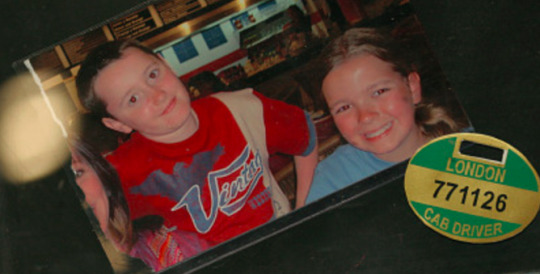
Image from here.
771126 looked like a date to me, but backwards.
77/11/26 or 26th November 1977. I googled it and the very first hit was something called the Southern Television Broadcast Interruption that happened on that date. This is it:
youtube
This video is titled “alien broadcast” or something, but it’s actually real footage of a real thing that happened on 26th November 1977 (a real hoax, done by people, not aliens). It was a broadcast interruption through the Hannington transmitter of the Independent Broadcasting Authority in the UK on 26th Nov, 1977. The interruption is generally considered to be a hoax, and the hijaker remains unknown. The interruption lasted 6 minutes, and took over the sound, leaving the video signal unaltered aside from some picture distortion. The speaker claimed to be a representative of the “Intergalactic Association”. It interrupted the news, then transmission returned to normal shortly after. Southern Television later apologised for a “breakthrough in sound”.
An explanation is given for how this security breach could have happened: “At that time, the Hannington UHF television transmitter was unusual in being one of the few transmitters which rebroadcast an off-air signal received from another transmitter (Southern Television's Rowridge transmitter on the Isle of Wight), rather than being fed directly by a landline. As a consequence it was open to this kind of signal intrusion, as even a relatively low-powered transmission very close to the receiver could overwhelm its reception of the intended signal, resulting in the unauthorised transmission being amplified and rebroadcast across a far wider area. The IBA stated that to carry out a hoax would take "a considerable amount of technical know-how" and a spokesman for Southern Television confirmed that "A hoaxer jammed our transmitter in the wilds of North Hampshire by taking another transmitter very close to it." However, like the Max Headroom broadcast signal intrusion a decade later, the identity of the intruder was never confirmed.

** Which means they had planned the HLV broadcast signal interruption story line before they even made the props for ASiP **
After all that I went on to casually start reading about Max Headroom (a weird thing I actually watched on TV in the 80s when I was little and the satire and subtext of it were beyond me) and found the British made pilot, titled “20 minutes into the future”. Weirdly, it’s very very relevant, and I don’t know if this cabbie number clue was meant to point me towards this, but it did anyway. I pointed out shortly after TLD aired that “20 minutes” had been said quite a few times in TLD, and that it was probably important (also see this and this). Also, mentions of 20 minutes in TLD and elsewhere are almost without fail a reference to something that’s going to happen in 20 minutes time, that is, 20 minutes in the future, as if it’s a countdown to something. Culverton’s life will change in exactly 20 minutes. John asks Sherlock if he will be okay by himself for 20 minutes.
To tell you the short version for now... the movie “Max Headroom: 20 minutes into the future” is about an evil television network hiding a dangerous truth from it’s viewers. People are dying because of this secret, in a most violent and terrifying way. A journalist is working to uncover the truth, and while doing so has an accident and is “brain dead” at one point before resurrecting himself from a morgue and coming back to complete his mission - *spoiler* the hero (the journalist) finally uncovers the truth! And reveals it to all via a live television transmission.
I also like this parallel ...The evil television network had taken the face of a dead man (the journalist) and used circa 1985 computer technology to animate his face so that he could continue to appear on camera in order to convince the public that he was still alive. Essentially, they turned him into a puppet.

The fact that we only see Moriarty’s head, and the unusual choice of backdrop for this shot of dummy!Jim which looks like it might possibly have been inspired by the amazing Max Headroom animation grid background..

...is all hopefully just a reference to the fact that someone was using Jim’s image to trick the public into thinking he was still alive when he wasn’t (even though in the movie he was actually still alive). Basically, the movie is about the media as a villain, hiding truths from viewers and brainwashing them, and a small band of rebel journalists (from within the evil media) who go on a mission to reveal this truth to the public. And they do reveal it, and the rebels win :) You can watch the movie here.
@ebaeschnbliah @the-7-percent-solution @longsnowsmoon5 @shawleyleres @impatient14 @gosherlocked @jenna221b @inevitably-johnlocked @isitandwonder @just-sort-of-happened
#sherlock#meta#did you miss me#signal interruption#asip#hlv#tin-hat#johnlock#tjlc#max headroom#20 minutes
2K notes
·
View notes
Text
THE BOOK AT THE END OF TFP!!! ITS A HUGE CLUE AND WE’VE MISSED IT. UNTIL NOW.
Okay so in my last post I talked about some things I noticed when re-watching TFP. Well, this one was so big I just had to give it it’s own post. I haven't seen anyone mention this yet so please read along if you've been a fan of all the tin-hatting. This one’s a doozy so hang in there, try and stay calm, and get out your tin hat.
At the end of TFP, we see Sherlock walking across the floor of TFP, through all the damage. We know from the past that everything Moftiss lets us see is relevant and there for have no reason to believe this is any different. Of all the books we see lying on the floor, the only legible one is this:

For a brief moment we even see the sunlight shine across the spine on the book. It reads: Katherine Neville “The Eight”. So naturally I did some research. here’s where it gets good folks.
When you look it up on Wikipedia, you see this:

Pay close attention to the genre. It reads: Mystery, CONSPIRACY FICTION, and THRILLER. I meAN COME ON.
Reading on, the synopsis states: “the heroine...must enter into a cryptic world of danger and conspiracy to recover the pieces of the Montglane Service, a legendary CHESS set once owned by Charlemagne” which SUDDENLY AND FINALLY MAKES ALL OF THESE PICTURES MAKE SENSE:

And so I go deeper.....
So basically the book follows two storylines, centuries apart 1700s-1900s, trying to locate the “Montglane Service Chess Set” the story continues as “in their respective time periods, follow a complicated path of intellectual puzzle solving, violent confrontations, and increasingly desperate attempts to gain control of the mysterious, apparently all-powerful Montglane Service” (http://www.bookrags.com/studyguide-the-eight/#gsc.tab=0)
idk like maybe just how Sherlock, John, and Mycroft play Euros’ game of intellectual puzzle solving, violent confrontations, and desperate attempts to gain control of the mysterious all-powerful euros in sherrinford???!!!!!
sound familiar anyone???!!!!
but WAIT THERES MORE
it states that the main characters after the climax of the novel, “return to their previous lives primed for the ultimate confrontation with both their personal missions and their opponents” um...end of TFP anyone? maybe they're both ready to confront maybe idk THEIR FEELINGS FOR EACH OTHER
MORE PARALLELS:
“The Abbey of Montglane” vs. Musgrave Hall
“the home of Mireille, Valentine and the Abbess, the place where the Montglane Service has been hidden, and the place from which its various components are distributed.” vs. the home of Mycroft, Sherlock, and Euros- where the clue to solving it is hidden in Euros’ song and gravestones aka “seek my room”
“The Montglane Service” vs. Euros
This is the chess set they're trying to find in the novel to protect it and it’s power from the world: “cursed and therefore hidden, and also believed to be the source of great power and therefore pursued by many (in both past and present) who would use that power for good or evil” I mean is this not Euros?? Hidden, Intelligent, pursued by her brother for good and Moriarty for evil??
“The Game” vs. The game is on
Apparently in the novel, “the game” is used repetitively in reference to the characters themselves being pawns to obtain this chess set. I don't think I even need to mention how this mirrors sherlock.
Prominent themes in the novel: Gender Roles, Love, Adventure, Subplots, Unraveling (the climax, the truth)
I seriously cant even believe moftiss just left this novel lying on the floor of 221b like nbd again with the “we told you but did you listen?” or in this case “we showed you but did you see?” As Sherlock says: “you see but do not observe”, ohhhhh we’ve been paying attention buddy
The number 8
Now this one may be a bit of a stretch but here it goes none the less....
The number 8 has a lot of religious/cultural significance, so much so that I won't go into it here but also, there are 8 pawns on each side when playing a game of chess. So I'm going to look at this as a good vs evil kinda thing present in sherlock as a whole but more specifically in TFP. Where the Good/Innocent/pawns: Sherlock, John, Mycroft, Mrs. H, Molly, Lestrade, Mary, Rosie . And the Bad/deceptions/pawns: The Cabbie, Shan, Moriarty, Magnusson, Norbury, Culverton, Sherrinford, Euros. All in all, our good characters we have come to love, and the villians- all pawns in euros’ and moriarty’s game.
In the end the protagonist takes control of the secret organization in order to protect what it’s hiding...just as mycroft regains control and stability of sherrinford to protect the outside world. so now John and Sherlock can finally confront their feelings for each other. finally. I have hope-tjlc is real and its not going anywhere.
There are even more parallels in quotes Im reading from the novel and the more I read, the more I find. I don't want this post to be too long but I believe Ive made my point. Again, I haven’t read this book so this is all surface-level analysis- but the parallels are no coincidence, and it is no coincidence that Moftiss let us see it on the floor, remember- the universe is rarely lazy, friends. If you want to add to this or elaborate please do!!!!!! xx
Everything I found came from:
http://www.bookrags.com/studyguide-the-eight/#gsc.tab=0
https://en.wikipedia.org/wiki/The_Eight_(novel)
READ THESE :
https://www.goodreads.com/author/quotes/7172.Katherine_Neville
http://www.katherineneville.com/about-my-work/my-bookessays/1581-2/
#sherlock#tfp#the final problem#johnlock#tjlc#thc#tinhatting#sherlock meta#moriarty#euros#john watson#moftiss#mycroft#tptb#bbc sherlock#sherlolly#conspiracy#tin hat club#twotwentyonethings
75 notes
·
View notes
Text
From Home to Home [excerpt from From the New World]
Scene One – Arrivals
The birch trees and apple trees and oaks were exceptionally beautiful on that September day, and so were the wide meadows that slowly lost their freshly green colour, and the fields that were ready to harvest, and no one could see them but the shy man in the blue suit.
He saw them, because he knew them well, and so he would notice. For the other passengers of that train, it was just a typical landscape, nice but generic, but for him, they were old companions he would only meet when he was on the way from one home to another.
He was on to return, if only for a while, to his first home, which he had not seen for many years. The man was born over there, and first returned as he went to University nearby. He used to visit his home town on some occasions, but he didn't find the time, or an important enough reason to do so for a much too long time. Now, he held a good enough cause in his hands. It was a telegram he received just a day earlier, and, in the manner of all telegrams, it was short, and clear. He could not have told his father or his brothers about the content of said telegram, as they would not have understood why he would follow it. An invitation to a picnic seemed just too irrelevant, in particular when it came from a man he last saw dead in an open coffin, more than a decade ago.
Thus, Adam decided he would simply tell them that he would visit an old friend, who might need his help, which was, he thought, at least not a full lie. Why would an old, dead man call a former student of his other old, dead friend, if not for help? That would not have appeared too plausible to his father and brothers, especially not from the man they thought to be the most rational and especially wary of them all. Of course, he was also regarded as a bit of the nutcase out of the family, but they never truly saw these characteristics as two sides of the same coin, and so, he was certain, his father would not have let him go.
He might have told him that he sensed a conspiracy and expected to meet someone connected to his friend's death, he thought as he intangibly greeted a willow, but he didn't want to tell anything but Truth.
“Next stop, Boston,” was heard from the gangway, and so Adam stood up and took his old, single suitcase from the luggage rack, careful not to add a scratch to the already worn looking dark red wallpaper.
As he stopped on the ground of the railroad station, Adam could see that few people were on his train. He could also see, that it would begin to rain, much to his pleasure, as he had not seen or felt or tasted rain in a long time. A cab went by, but Adam let a young woman climb it instead, as he was not expected to reach his destination until the next hour.
“That's very gentlemanly of you,” said the young woman, and she was a very handsome brunette with warm blue eyes. “Won't you share the cab with me? Where are you heading for?”
“No thank you, Mam. I am heading for the park,” explained Adam, and at that she made a grimace.
“The park, in this weather? Why don't you go to the hotel?” she asked, and Adam knew what answer she would hope for and which he would not give.
“Because, Mam, I am heading for the park. Have a very nice day.”
At that, Adam nodded to her, closed the door of the cab and went to sit under a canopy, with his suitcase behind his legs, and took out the telegram again, only to put it back into his pocket, as the rain began to increase. A nervous and thin young man, standing on the platform, greeted Adam shyly, but hastened away as Adam signalled him to get under his canopy, and out of the rain. With a scowl, he leaned back and gazed around, but all he saw were busy people, blurred by the rainfall, until another cab came by, which no one else wanted to take. It did, in fact, look quite undesirable in comparison to what most of them were used to. The cabby and horse looked good-humoured and sober, but past their prime. The cab itself was well-made but dirty and scratched.
“To the park, please,” said Adam as he climbed the vehicle, and the cabby did as he was told without turning around or saying anything. The horse was a golden chestnut gelding, certainly once handsome, and he trotted his way from the platform, to the city.
“How old is he?” asked Adam, who usually didn't enjoy small talk, nor felt obligated to talk with a cabby - who did, after all? - but it was useless, as he got no answer but a smile. He was, for a reason unknown to him, uncomfortable with the silence coming from the man.
As they went on, the streets felt stranger and stranger to Adam, but he joined the cabby's silence, trusting in him to find the way to the park better than he would.
Perhaps, he thought, I have become a stranger myself by now, a thought he didn't like at all. There was no familiar tree or building, and Adam wondered if it was truly the right way from the railroad station to the Boston Park.
The cabby had elegant hands although his nails were dirty and he held the reins perfectly. He had a noble, and stern face, with unnecessary fat making it look friendlier and gentler than it might once have been. Questioning his sense of orientation would not have any kind of useful result, and so Adam said nothing at all and closed his eyes instead.
After what might have been half an hour or an entire month, the cab came to stop and when Adam opened his eyes again, he saw the park. He quickly took his suitcase and jumped off the cab quickly, and paid the cabby, who left without a word.
_________________________
Scene Two – The Soft Place
Gratefully, Adam realised that the park looked just like he remembered it, although he was surprised of how far Autumn had progressed by now. Most leaves were golden or brown, and many of them had fallen, now covering the ground, causing a beautiful contrast to the grey of the light rain and the fog. It could have very well been late October.
As with the railroad station, there were not many people around, which was not surprising when considering the weather. As the young woman said, who would visit the park in cold rain? Adam did not sigh, but he took a deep breath, put the suitcase handle from his right hand to the left, and followed a path through the park.
Visually, hardly anything had changed, except for the occasional bench, but atmospherically the park felt different. It was not the light, and content place he used to know. At first, Adam thought there was a kind of melancholy around the place, an false idea, as he quickly realised, and as such attributed to the weather and his own feelings. The park was not melancholic, it radiated an underlying exuberance of a strength that turned into a bittersweet exhaustion when touching a human being.
Near a weeping willow by the river was a large, cream coloured umbrella, and below the umbrella sat - “Mr Mills!” exclaimed Adam and walked faster, although he did not run until he freed himself of conceited maturity. After all, why should a grown man not run like a child to greet a dead friend?
The man got up with a surprising swiftness, and he had a friendly face with a wide mouth and dark, deep set eyes. “How are you, Adam, dear boy?” he asked Adam looked at him in surprise.
“I am fine, Mr Mills. But how, in this world, are you? I mean, how are you in this world?”
The old man, who didn't look quite as old, now that Adam could see his face better, sighed and looked at him, with smiling eyes in a serious face. “That is a long story, and I am not a storyteller, so we will have to postpone this matter. Sit down and have some cake, Adam. It's incredible.”
Adam did as he was told and sat on a large, blue picnic blanket beside Mr Mills. There were three different tea kettles and plenty of filigree cups, several kinds of cake, four plates with sandwiches and pale cream coloured cuboids that appeared to be burned, all safe and dry below the large umbrella.
“Isn't that a bit too much for two?” asked Adam and the other man shrugged.
“The feast beasts will take further care of it,” he said and took a sandwich.
He is actually able to eat, found Adam and stared at him, then at the food. He cautiously took a sandwich of the same kind, it had cucumbers on it, and ate it. It was absolutely real.
“Might I ask if you are alive?”
“No,” said the man and took a sip of tea that smelled like roses.
“I might not ask or you are not alive?” Adam persisted and the man frowned.
“I don't think I could answer either question properly right now, my boy. I told you, I would tell that story another time. It is not relevant today.”
“A man invites me for a picnic, thousands of miles away from home, in the rain, and it is not relevant if he is alive or not?” Adam asked.
“Well, yes, indeed. It is not relevant, not today. I am alive enough to talk about plenty of other things. What are you alive for if not for living?”
At that, Adam had no response, and stared in his teacup, which he did not realise he had filled. He took a sip from it, and found that it tasted slightly like hay, although not in a bad way.
“What is this?” asked Adam after he had tried one of the burned cubes. It was very sweet and sticky and it tasted like nuts, and roses.
“Marzipan, I got it from one of my travels. In this case, from Königsberg,” said Mr Mills.
“Did you travel a lot lately?” asked Adam.
“Yes, a great lot,” said his old friend as he handed him a small cake with indigo dots in it.
“Blueberries are good for your aiua,” he noted to which Adam had no reply. For a while, he said nothing. He just gazed over the rusty trees and the few lonely people he could see. Some of them were dressed in very peculiar ways, but Adam did not care about it. It was the season that made him worry.
“What is going on in this park?” he asked after a while. “It's early September and it seems as though Fall progressed too quickly over here. It's much different only a few miles away, I've spent the entire train ride looking out of the window.”
“We are not in the park, my boy. But that does not matter either. You learned some Latin and Greek for your matriculation, am I right?”
Adam stared at him without answering until he realised what Mr Mills had asked.
“Yes, of course. Basic, I might add.”
“Ah, don't worry. We can build on that. Are you married?”
“No.”
“That's fortunate. Your brothers are grown up by now?”
“At least that's what they think,” said Adam and smiled for the first time, although it was not a truly happy smile. Mr Mill's questions made him uncomfortable.
“If that's not the park,” he began, not because he cared any more, but to change the topic, if there ever was one, “the how did the cabby find it? Why did he use such a strange way to begin with?”
“I've sent Elio to get you. He would have come here, even if you'd have asked for the Tremont House. But do not try to distract me. Do you plan to stay in Nevada? For the rest of your life?”
“Why are you asking me this? I will not leave my family, not permanently.”
“Not permanently, no. But occasionally, for a while. Not too long a while, at least for them. Don't you want to travel, Adam? You are intelligent, loyal, and imaginative.”
“Imaginative, are you certain?” asked Adam with a sarcastic laugh. As a response, the man clapped his hands and the entire picnic disappeared, along with the umbrella and the Fall. It was still rainy, but warmer, and only a few leaves were light yellow and fallen by now. There were few people still, but all of them were dressed conventionally nobody appeared melancholic.
“We have now left the Soft Place, Adam, and don't deny that you have seen it all.”
Mr Mills got up and dragged Adam behind him, with an unexpected force. “Come with me,” he said.
“Where are we heading for, Mr Mills?”
“For God's sakes, it's Robert. I told you, it's Tremont House. The cabby might not bring you there, but I sure will. You will meet an old friend there. Or an acquaintance, whichever you prefer.”
_________________________
Scene Three - Acquaintances
“Two, actually,” said Adam as he saw the three men sitting in the suite.
“I thought we would not be as attention stealing in here,” said Charles Dickens to explain the expensive room. “Good afternoon, Mr Cartwright. It is a pleasure to see you again.”
The other man Adam knew was Samuel Clemens, who just recently made himself a name as the journalist and writer Mark Twain. There was also a third man, which Adam had never seen before, and who introduced himself as -
“Jules Verne. It is a pleasure to see you for the first time, Mr Cartwright. Charles and Samuel always spoke highly of you and I couldn't wait to make my own impression of you.”
“Are you satisfied, Monsieur Verne?” asked Adam, who was surprised about the Frenchman's unusual interest in him, but who also did not want to reply too tamely.
“Oh, yes. But I thought you were younger. You must be about my age, older than Sam.”
At that Adam frowned. Why should he want him to be so young? Before he could reply, he was led by Mr Mills, from now on to be called Robert, to a chair, opposite Charles Dickens, while Robert himself squeezed himself between the two younger men on a couch.
“I admit,” said Dickens to the Frenchman called Jules Verne, “that he is not exactly young, but you ought to remember that age is not a matter in this choice. You two were unusually immature when selected, and you still have not matured much. I think it will be very reassuring for me to finally have an adult among your ranks.”
“Among what kind of ranks?” asked Adam and scowled at the other men. “What in the world is going on here?”
“That's incorrect, kiddo. What in the Worlds is going on. But I am not permitted to tell you – he is,” he added and pointed at Dickens with a tumbler.
“Mr Cartwright. You know that I have a very high opinion of you,” said Dickens as Adam raised an eyebrow. “But I also have to make a request. I want you to become a Caretaker.”
“A Caretaker, of what?” asked Adam and Sam quickly filled a glass with Bourbon and handed it over to him, with a face that indicated he would need a drink very soon.
“Of the Imaginarium Geographica. Don't make such a face, I will explain. Just imagine... imagine it is...”
“All real,” finished Jules for him. “Imagine everything that is True is also Real.”
“I don't think I can follow you,” said Adam and allowed Sam to refill his glass. The suite looked much darker by now, it was at least late afternoon.
“Every imaginary and fantastical place – or at least most of them,” said Sam. “But don't imagine – consider. Consider it is all real.”
“I don't think I could do that.”
“Could you Believe?” asked Robert. “Could you? I am the only one of us, who is not a Caretaker. I am a friend of them, and I am your friend, and that I will be forever, no matter what you will choose.” He took a deep breath and leaned back.
“You are not only a very skilled, but also a very imaginative person and when Charles here asked me out about you, I did not hesitate for a second to recommend you as an Apprentice Caretaker. You can believe that I am here, can't you? And you saw what was not, in fact, the park.”
Adam said nothing for a while. The entire situation was ridiculously unreal, like a dream that was not a nightmare, but nonetheless uncomfortable and which he would try to forget.
“What is the Imaginarium Geographica?”
“An atlas, of all these lands. They are found in what is called the Archipelago of Dreams, which exists beside our Summer Country,” said Dickens.
“And taking care of it means what exactly?”
“It means not only to take care of it but also the Archipelago itself. Your occupation would include visits to the isles of the Archipelago, both political and practical. You would get introduced to the Caretakers Emeriti in time and you would also be trained in Ancient and contemporary languages, of both Worlds, among other things. Jules and I are full Caretakers, Sam is an Apprentice.”
“And what about my father and brothers? Have you ever considered my life over here?”
“Have you ever considered ours?” asked Sam. “We are here, after all. We all have our families and lives, and our occupation is not a prison.”
“I am sorry,” said Adam. “You are right, of course. You are all here, and most of you alive?”
The three Caretakers nodded, and Robert chuckled. “Most Caretakers are writers,” he said. “Some are scientists or musicians, few worked in different fields. I am keen to have an Architect among them – Architecture plays a much larger part in the matters of the Archipelago or the Geographica than most people are willing to admit.”
“Really?” asked Sam. “I thought the fun of it was to have a cowboy among us.”
“Has anyone of you ever considered myopinion on that matter?”
“No, actually we didn't,” said Sam. When Adam looked back at that, he ironically found that it was this exact line that, despite his anger, finally won him over.
_________________________
Scene Four – Back at Home
“I wonder what that telegram said,” said Little Joe and his older brother nodded slowly. They sat near the fireplace and baked apples, in the way Charles Dickens once taught them to.
“He was in such a hurry to get to Boston,” said Hoss, not turning his eyes from his apple. “I just hope it was nothing bad or dangerous. Pa seemed confused, too.”
“I'm not confused,” said Ben as he walked through the front door. “Except about this activity of yours. What in the world are you doing?”
“Baking apples,” said Hoss. “You want one?”
“No, thank you. That's what Mr Dickens did, right? Did you think of him, or how did you get that idea?”
At that the young men looked at each other and frowned.
“Actually, I have no idea, Pa,” said Little Joe. “We just thought it would be right, now.”
“It's suits the weather,” added Hoss and Ben shrugged.
“I will go to bed,” he said. “I don't think I'd want a baked apple now. And don't get to bed too late yourself.”
He was worried about his eldest son's situation, but he also knew that his judgement could be trusted. He would come home safely, very soon.
#writing commissions#commission blog#commission writing#example#fanfiction#crossover#middle lenght#excerpt#[fandom: Bonanza]#[fandom:Chronicles of the Imaginarium Geographica]
0 notes
Text
Greek Life
Hi guys I’m just starting a Travel blog RIGHT NOW bc I’m studying abroad in Berlin this semester and this past weekend has an INTERESTING weekend in Greece to say the very least and wanted to document this for posterity. Its long but I promise u theres a lot, from concerts to city-wide evacuations.
An important part of context here is that the Patriots just won the Superbowl and some friends from school back in New York were throwing a party and decided to /sarcastically/ name it a Pats Victory celebration and of course, invite all of us abroad kids. Of course I RSVP’d to this party halfway across the world, I’m no stick in the mud. But alas, realistically my roommates and I knew we couldn’t fly back to the states just for one night, as such an endeavor would not even come close to being in our maximum joke budget of $200.
Obviously the next closest thing to celebrating a Patriots win in NYC is going to see the Dropkick Murphy’s live in concert, if not only to hear “Shipping Up To Boston” (which you may not be able to identify by title alone but will certainly be able to identify by the distinguished bagpipe and accordion undertones). And it was just our luck that they happened to be touring in Europe at present, and would be performing in Thessaloniki Greece the following night, and tickets to Thessaloniki were only 50 euro round trip, and we found an Airbnb for $16. It was God’s will for us to see this band, so we booked our tickets for a flight that left in 8 hours.
Maybe this is just a RyanAir thing, or maybe its a European thing, but the most notable aspect of the flight itself were the increasingly bizarre onboard sales. It started normal enough, with croissants and coffee. Then it moved to paninis, somewhat odd for 6 in the morning but hey, to each their own. Then they moved on to perfumes, boasting the lowest prices for designer names on all of european flights, which is a lot of qualifiers that raise suspicion that they may simply be the ONLY European airline that sells discounted designer perfumes. Finally, they started pushing lottery scratch cards on us, which felt shady but maybe Europe or the skies have different gambling laws, I’m no airplane lawyer. But they were REALLY pushing the scratch cards. They even offered a “one time deal” of giving two for the price of one (which was interestingly the exact same deal they offered on the return flight).
After we landed our first real hurdle was trying to get into the city as two American assholes who spoke literally no Greek whatsoever. If you’re thinking of that “It’s all greek to me” joke right now we not only beat you to the punchline but we beat that dead horse innumerable times over the rest of the weekend. Luckily there was a line of cabs outside the airport and I happened to have a screenshot of the location of the house on my phone. I handed it to the driver, he looks at it, shakes his head, takes it from me, looks at it closer, says something in Greek, gets out of the car with it, and walks to the next taxi in line. Soon the ordeal becomes every taxi driver’s business as about five Greek men stand behind this cab arguing over my phone. We just kind of watched them, doe-eyed from the back of the cab, not sure what to do. At the same time, a man behind them carrying a crate of oranges trips and spills the whole crate of oranges out into the street. This has no relevance on anything that happened, it was just some of the funniest imagery we’ve ever seen in real life. Eventually the cabbies sorted it out I guess because we were on our way.
The first thing we noticed about Thessaloniki is that there are stray cats just everywhere. They mind their own business when it comes to humans, but at night you fall asleep to the not-so-distant sound of cats screeching and hissing as they fight with one another in the streets below. The second thing we noticed was that the whole city is a designated smoking area. Maybe I’ve lived a privileged life in the states where indoor smoking has been outlawed for most of my life but I swear I ingested more smoke over those two days in Thessaloniki than I have in my entire life. The third and last thing we noticed was that at literally every restaurant, you got more food than you asked for. And I’m not talking about big portions, I’m talking about a full extra course (usually a dessert or appetizer, but still). The best was the waiter in a relatively empty cafe who spoke very little English and who set down two little pastry/pie/ things for us and explained “Ehh... my grandmother...” It was just disgustingly adorable stuff right there.
Less adorable were the very intimidating punk Greek kids at the concert that night. Theres something about understanding exactly none of what everyone else is saying that makes you feel incredibly vulnerable. Take that situation but add more leather jackets and mohawks and you’ve got yourself a Friday night concert in Greece. We did meet one guy there named Costas (I apologize for spelling errors but I think I’ve already demonstrated my astounding ignorance to Greek culture). He asked where we were from and we told him Boston and New York (Is it condescending that I assume Europeans might not know where Morris County, New Jersey is? Most New Jersey people don’t even know where it is). He responds with a “What the fuck... why are you guys here?” I chose to take Costas’s inquiry literally, and not even bother to venture down the rather existential and metaphorical question of why am I really here? Why are any of us here?
To be fair, I didn’t have a definitive answer to either the metaphorical or literal interpretations.
The concert itself was disappointingly good. When you go to see a band sarcastically you’re ready to stick it out to get a recording of the one song you came there to see, which in our case was “Shipping Up To Boston”. But Dropkick Murphys are surprisingly good live, and have a surprisingly large following in Thessaloniki Greece. We thought everyone there was just college kids that wanted to go to a random concert, but they all knew all the words. Even the people that didn’t speak English.I’m not even sure The Dropkick Murphys could draw a crowd that large in America, even in Boston.
Some instruments used in their live performances include (but are not limited to): bagpipes, a banjo, an accordion, a flute (played by the same man as the banjo). At one point the audience rushed the stage and all of the girls were all over the banjo/flute guy.
But the most distinct memory I have of this concert is the lead singer yelling “The state of Massachusetts!” before one of the songs and the crowd going absolutely nuts. A whole crowd of 20-something year old Greek kids were losing their minds over the concept of the entire state of Massachusetts as a whole.
On our walk back to the Airbnb after the concert we met a stray dog under a streetlamp who began to walk at our side for several blocks. It felt like we just got a video game sidekick, or that he was giving us directions or something. He was very old and calm and we decided to name him Murphy. After about five blocks Murphy decided we must know where we’re going and just turned around and walked back off into the night. Even though I’ll probably never see him again, I’ll never forget you, Murphy.
We fell asleep to the sound of a cat fight.
We woke to the sound of someone yelling through a megaphone in Greek from probably a few blocks away. I have no idea what this man was yelling about but it sounded like some kind of propaganda or protest. We never actually saw this man though we heard him twice. He only every existed as an angry disembodied voice with some kind of goal.
We got brunch and looked at a bunch of really old buildings. I don’t know what they were because all of the plaques and descriptions were in Greek, but I’m sure they were very important buildings.
The rest of our trip was pretty normal. We had dinner and walked back to the house. We went to bed because we had to get up early to catch a bus to the airport (we got insider info that there was actually a 2 euro bus to the airport from the owner of the Airbnb).
As I write this I have been back in Berlin for almost 12 hours now and I just saw a BBC article written 10 hours ago with the headline “Greek WW2 bomb deactivated after mass Thessaloniki evacuation”. At this point in bizarre experiences for the trip it seems to be just about par for the course, the cherry on top even. We missed a large scale city evacuation by the thinnest of margins and I honestly don’t know what we would have done if we had been in the city during it. I have class tomorrow. I know travel doesn’t count as an excused absence but what about WWII bomb evacuation absences?
I’m splitting hairs here. The point is, I hope my two wonderful Airbnb renters Otar and Maria, Murphy the stray dog, and our boy Costas are all ok and safe. And I hope that you, dear reader, will some day get to party with the Greeks or at least with the Dropkick Murphys. #KeepThessalonikiWeird.
0 notes
Text
It’s a Travel Day for John, So It’s a Travel Day For Us — July 5th
The next morning, I woke up to packed luggage that only needed a few additional pieces re-added and checked out of my hotel. I chatted briefly with the front desk woman, the one who had chatted with me the night before about John.
That chat morning was shorter. I recounted some of what had happened while waiting for a taxi. My luggage was still small enough that I could nest everything except the backpack with the small wheeled luggage going inside the big wheeled luggage and the Hedwig bag sitting empty in one of them.
As I had planned the previous night, I stopped by the theatre before going to the bus depot to pick up the poster. The front desk guy did a double take seeing me out of the heavy makeup I had worn for the show. He had to check that it was actually okay to give me the poster and we chatted some more about the show the previous night, how much I’d enjoyed John, how much I’d enjoyed meeting him after…. I would have loved to have chatted more, but…I had left the meter running and had to get back so I would make the time for the bus.
The bus ride back was smooth and uneventful. It had taken them a little while to get there again and again, the designated lane for where my bus was supposed to be was largely irrelevant.
Once we got going, I thought about opening the movie version of Priscilla again to pass the time, but thought that it might be a little too on the nose to be on a bus in Australia watching a movie that largely takes place on a bus in Australia. The only way it could have been more cliché would have been if I had watched it while I was leaving Sydney.
Instead I listened to music, attempted to get my phone to play Moulin Rouge, and replied back and forth with David as to when I would be able to meet with John, confirming that I was going to all of the shows and forwarding my ticket information so that he could see which cities I’d be in when.
Arriving at the Sydney airport was, again, easy. I collected my things and headed for the nearest shops. We appeared to be on the other side of the airport from the last time. Any other airport, I’d have thought I was already past security and into the giant mall that most airports have lurking behind the security checkpoints and before the gates.
I walked into a very large convenience store that featured travel accessories like small luggage, travel adaptors, neck pillows, translation books from other languages; a small book and news section; large aisles filled with chips and candy bars and any amount of food that could be taken on the plane, some of it in quantities that really shouldn’t.
I scanned the entertainment magazines for anything that looked like it might have press on the show. Still nothing. And being in Sydney, they didn’t have any press from Canberra. I had had to duck out before checking to see if there had been a printed review of my show, but put it aside as something to maybe look up at one of the local libraries if I had the chance.
I then set about collecting candy bars, drinks, and crisps for the trip. Remembering my mother’s trip to England from 2003, I also bought a few things to bring back with me to try. On this first round, I tried to stay away from American foods unless it was a flavor that I absolutely could not get in the US or in the case of Raspberry Coke, couldn’t get in a bottle in the US.
The next thing on my list was getting chips with chicken salt. Aside from prepackaged stuff, this was recommended to me specifically as something to get. I love chips. Of course I had to try them. As I sat in the food court, I texted a couple of people about what I’d done so far, how Canberra went, how meeting John went, and then headed out to find the trains chips still in overloaded hands.
I walked for what felt like forty minutes to get to the ground transportation station. And then another ten trying to figure out where the trains were compared to the more obvious bus depot, cabby stops, and parking complex. Finally I caved and asked someone for help.
They directed me back towards where I had been and said to take the elevator to the second level.
I got on the second level and was in no great hurry to find the train. I wanted to regroup my stuff to a more manageable configuration and finish my chips. I had had so much stuff that I bought in the convenience store that I had to purchase one of the big plastic bags to carry it all. I repacked some of the stuff into my luggage to make the bag less overflowing and fished out a different battery pack from the one I had been using. Two days in Australia and I still didn’t have a travel adaptor, having thus far relied on my batteries and USB charging ports on the planes and on the bus.
My first glimpse of truly friendly Australians were was at the Central train station. I had to change at Central from the airport line to get to the station I was actually staying at and while I waited for the elevator, I met a lovely older couple waiting to do the same.
We figured out that we were headed for the same platform and while we were in the business of getting there, I was asked about where I was coming from, what I was doing, where I was going, what I’d be doing for three weeks in Australia. The woman mentioned that she had used to do a lot of traveling when she was younger, but not anymore. She thought that it was great that I’d done all this by myself and that I’d been to Japan by myself. That I was very brave and that she wished that she could still travel on her own. I thanked her for the comments and the help with the elevator as we parted ways. Australia was so much more friendly than the US. Or at least more genuine in their interests.
A couple more stations and I was at my stop for the hotel. I stopped off at a newsagent to check once again if John had made the newspapers as they had a different selection and some of the ones here were the monthly editions that might have had previews. Unfortunately, it was still too early in the month for the newer and possibly more relevant ones to have been delivered.
Having selected a few pens and a couple of post cards, I asked the news agent if all travel adapters were comparatively priced to the one he had for sale. He said that they were and warned against the ones you get out of a vending machine as they might fry the electronics, but that I could get one at the music and electronics store JB HiFi if I didn’t want to buy one from him. I thanked him and went on my way.
The walk to the hotel with the bags felt more dangerous than it ended up being. The sidewalks were incredibly narrow once I got beyond the juncture closest to the train station, it was barely wide enough for my bag to follow behind me and the cross streets were slanted one-ways like Westport.
But soon enough, I checked into the hotel checked into the hotel, settled in a moment and then with some direction tips from the lady at the front desk, headed out.
I wanted to go to a record store in Australia. So I went to JB HI-FI. And Woolworths. And the newspaper stand by the airport. And finally a proper record store.
I bought a few DVDs and CDs at JB Hi-Fi, ones that I couldn’t find in the US. I confirmed with one of the sales guys that the USB charger I had picked out would work with my devices, suddenly second guessing myself because of what the newsstand guy had said.
At the Woolworth’s, I spent time taking photos of the interior as well as shopping the aisles mostly picking up small things to eat back at the hotel, but also a couple of souvenirs of the trip for my friends.
The record store that I had been aiming for was less than half an hour from closing by the time I found it. I poked around a couple of sections, pulling out things to buy there or to find off of ebay finally making my pick with two higher priced CDs. The shopkeeper was very not impressed with my timing.
Having decided that I hadn’t had enough to do that day yet, I went back to the hotel to drop off my newly stuff and took the train to the Opera House.
I hadn’t intended to walk to the Sydney Opera House for the first time as late as I did, but I felt like I needed to see it at night and walk there first, before going to do my first activity there. I was so close to it geographically, that going 20 minutes out of my way to not be late when it mattered seemed the thing to do. And it was truly spectacular. I walked to the wrong side of the harbour at first, circling what felt like the long way round until I hit the deadend of a neverending expanse of water. It seemed just small enough that someone could conceivably think they could swim there from where I was. And just turbulent enough for someone to get swept away in it.
I ended up using the bathroom in a restaurant that was just about to close before heading over and walking around for the first time.
Once I was on the right side of the harbor, I found not only where I was supposed to be meeting the tour group that morning, but also where the stagedoor was.
Even if John hadn’t been playing the Opera House, I would have wanted to have gone. It’s iconic and beautiful and referenced in one of my other favourite movies, The Adventures of Priscilla, Queen of the Desert.
I took a lot of photos and headed back to hotel finally ready for bed. I still had to be up early for the Opera House tour the next morning.
#Australia Travel Diary#australia day 3#sydney day 1#sydney travel diary#travel diary#travel day#not a show day
0 notes
Text
What happened to Sherlock? Part VII – The Importance of Being Earnest (2)
This is the direct (and lengthy) continuation of Part VII in my meta series “What happened to Sherlock?”. You can find the first post of this installment here. I’m now going to continue testing my Hypothesis #7, which goes like this:
Hypothesis #7. By TFP Sherlock has managed to figure out some essential things about John and the importance of staying alive, and he has managed to get in touch with his own repressed emotions.
In the first post I tried to verify the two first statements of this hypothesis, and here I’ll focus on the third statement about repressed emotions. After the hug in TLD, Therapist!Sherlock (assuming Eurus=Sherlock) thought that John felt ‘so much better’. But then Detective!Sherlock noticed that something was still wrong; his client seemed to be channelling Satan and Faith’s note was actually ‘real’. The scenario ended with Therapist!Sherlock shooting John in the face, but in TFP we learn that this was done with a tranquilizer, so John survived. Which brings us right into:
Prediction #2: If Hypothesis #7 is true, Sherlock will have to confront his childhood trauma and the context where he chose to repress his emotions.
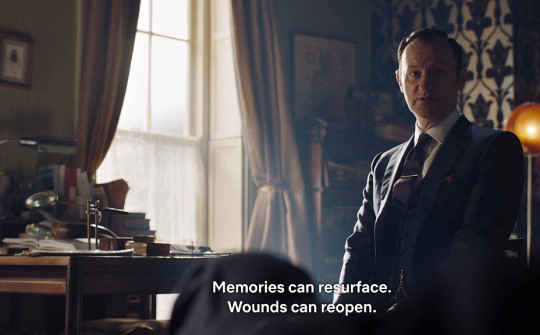
Sherlock really needs to stay alive for John’s sake. But how can you stay alive when Emotions are killing you? Sherlock might think the only solution is to bring them on and face them, try to beat them ‘in a death-defying act’. Which means Sherlock must go deeper still into his own mind, to face his demons.
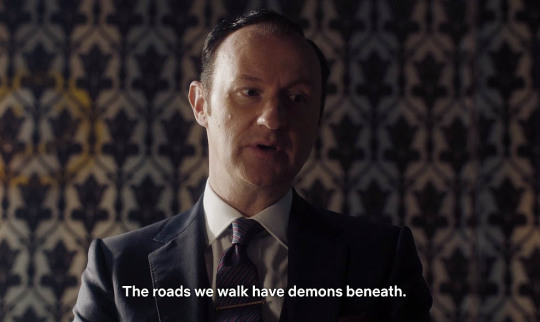
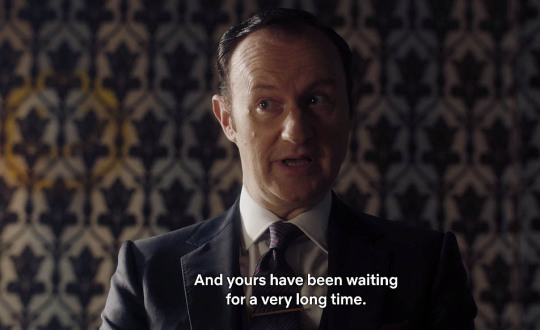
i actually think this is the single bravest thing Sherlock does in the whole show this far. And in order to face his demons and traumatic memories, he needs to perform his Mind Theatre experiments on himself. But who’s the scientist then - who is setting up the experiments? I believe this is done by Sherlock letting someone impersonate a side of himself that he has been hiding and neglecting for a very long time, and who therefore appears to be a cold, calculating psychopath to be feared and avoided: Sister Sentiment.
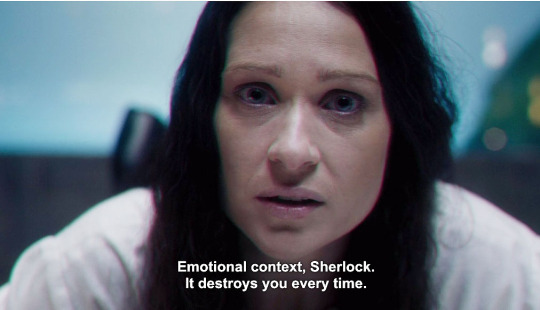
@beingallmysterious said it in their very brilliant meta about Eurus representing Emotion (my bolding, the link also contains the additions):
“The final problem then is reason vs sentiment. How do we live with emotions? Should we lock them up as Mycroft recommends? Sherlock has tried this and it didn’t work. So what’s Sherlock’s solution in the end? He lives with her. He accepts her. He becomes whole again. Reason and sentiment”.
This is, basically, what I think TFP is about. Sherlock might believe he has to defeat and disarm Eurus, but this story tells him (and us) that he rather has to embrace her, accept her as a valid part of himself. So let’s keep on running the scenarios.
TFP, Scenario 1: What happened back then?
Inspiration: It seems like this scenario starts when Mycroft is forced to talk about his and Sherlock’s upbringing and their ‘lost sister’ Eurus. We go back to their childhood and the mansion where the Holmes family used to live. So some of this might be based upon Sherlock’s real memories. But there’s also a resemblance to certain horror movies, which I doubt is a coincidence. I rather believe this is Sherlock’s way of deflecting traumatic memories he’d rather not get into. He uses characters from these movies as ‘actors’, with scary, supernatural powers representing Eurus, such as Orphan:
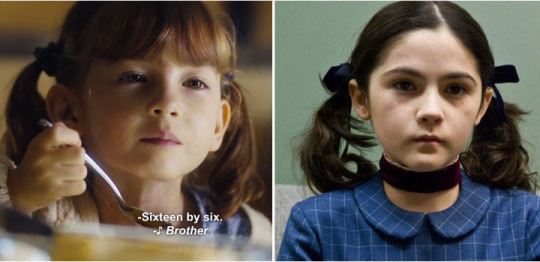
Or The Ring:
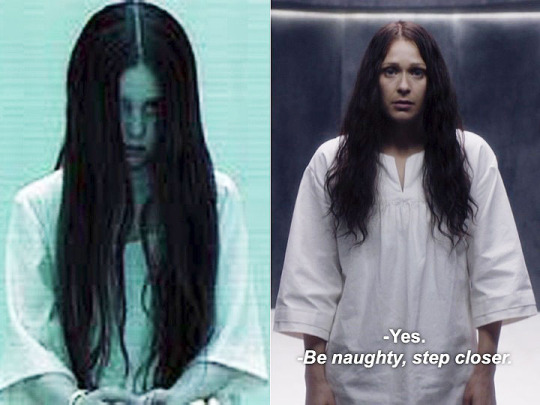
As a bonus, this girl from The Ring (Samara is her name, by the way) also happens to come out of a well (see discussion on the 5th scenario of TFP at the end of this post) and she climbs through the screen of the telly, a bit like Eurus slips through the suddenly non-existent glass wall at Sherrinford.
[Running a scenario where Sherlock and John scare Mycroft into telling the truth about their childhood, when Sherlock used to play pirates with his dog while little Eurus played alone, and they had ‘honey for tea’ at Musgrave Hall. But Eurus seemed to want Sherlock dead and set the mansion on fire, and in present time 221B gets blown up by Eurus’ ‘patience grenade’]
Result: We learn that little Eurus (=Sherlock) set the house on fire and was then ‘taken away’ to some un-named ‘suitable place’, where she started a new fire. And then Uncle Rudy ‘took care of things’; she was declared dead but secretly sent to Sherrinford. In spite of all the absurd creepiness (bizarre clowns, explosions etc), present day Sherlock’s search for his sister leads them to Sherrinford, an isolated prison island way out at sea, where she is (supposedly) locked up. And since John was only sedated at the end of TLD, he’s now with Sherlock again. But well there, the nightmare continues; Sister Sentiment takes over their free will pretty quickly.
Discussion: @sagestreet has made an interesting analysis based on the idea that the memory sticks that keep popping up every now and then in the show represent Sherlock’s “’lost’ memory (about his traumatic past and subsequently repressed gay identity)” @sagestreet theorizes that this ‘lost’ memory might be based on the experience that “Sherlock’s dad was in a gay relationship with his best friend and something went very, very wrong”. And, furthermore, what if this friend was ‘Uncle Rudy’, possibly the brother of Sherlock’s mother?
This idea would be interesting to explore further, and I replied to @sagestreet‘s meta with some more speculation: A triangle drama like this might have had an emotional impact on the kids, perhaps enough to make the older Mycroft ‘abandon’ his own feelings and try to make his little brother do the same. But if little Sherlock (=Eurus) had a too emotional personality to even manage to distinguish one feeling from the other in this mess...
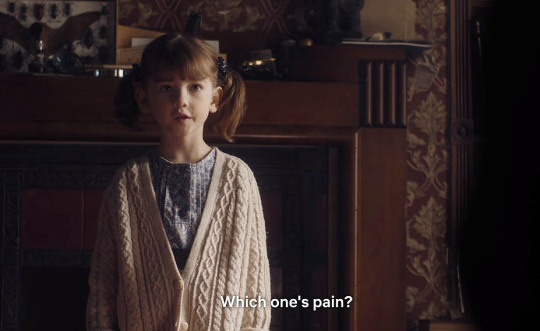
...he might have confused the situation of jealousy, guilt, anger, betrayal etc. in the family with his Dad’s sexual orientation. And it all might have been mixed up into internalized homophobia, where Sherlock would blame himself for having the same kind of feelings as his Dad, which would make him think he risked dragging others into pain and misery.
So what did actually happen? I don’t think we (and Sherlock) really get the answers in TFP, but we do get to feel some of the emotions connected to it, and that’s at least a beginning. Was there a suicide in Sherlock’s family, connected to a possible triangle drama? Or was an impending ‘scandal’ with secret-keeping in a chaotic family situation enough to mess up Sherlock’s emotional life? Was young Sherlock sent to a boarding school? Mental institution? Well, I do hope S5 will offer satisfactory answers to this.
TFP, Scenario 2: Is caring an advantage?
Inspiration: I think this is a key question for Sherlock, something he has been mulling over since he realized that his attitude doesn’t sit well with John, and maybe was the last straw in making John abandon him for someone else. John has been questioning Sherlock’s humanity at least since TGG, and possibly even earlier. If Sherlock did indeed ruin himself on drugs while reading John’s blog after the wedding (as I suggested earlier in this meta series), I think it’s relevant that this is how he came across on the blog after TGG:


So yes - this is one of the main problems that Sherlock needs to investigate in his Mind Theatre to find out what went wrong between him and John.
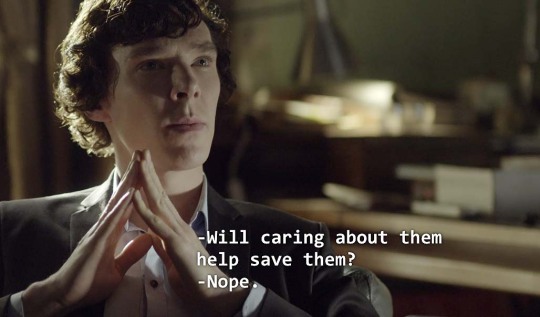
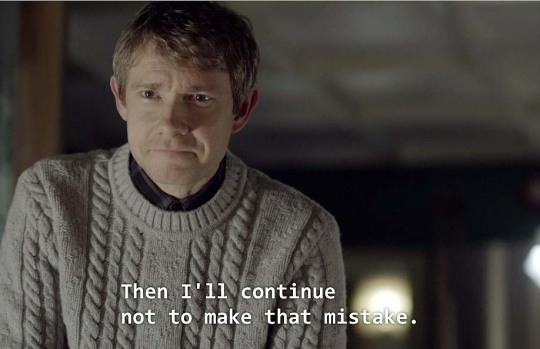
But Sherlock’s statement is contradictory (which I believe John tends to miss, at least consciously). Because trying to save people’s lives already means caring. Sherlock’s actions prove that he already does care about people - why otherwise would he work on crime solving? There are many less humanity-serving ‘games’ he could play and puzzles he could solve to keep himself entertained. So Sherlock definitely does care, but I think his real problem is that he doesn’t permit himself to feel it. Because feeling compassion means exposing himself to other people’s suffering - and his own. Sister Sentiment will make him suffer.
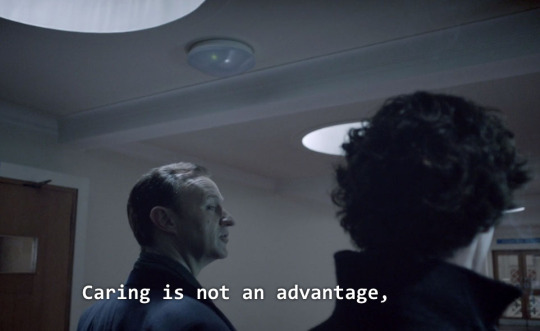
This is what Sherlock has been told, probably by Mycroft, in an attempt to protect his overly emotional little brother from the cruelty of life. The question is, though: Not an advantage for whom? Caring certainly is an advantage for the people you care about. It’s just that it might make you suffer.
[Running the scenario. For the first time in this story Sherlock exposes himself to his own experiments, rather than someone else. These are ethical dilemmas and he finally gets to the point where he’s sincere enough with himself to really face these demons. Because he used to hide from them before, which has deprived him of John. And - as @beingallmysterious said in their meta about Eurus - this is what Sentiment does to you: “Eurus puts Sherlock through torturous mind games. Doesn’t emotion do the exact same thing?” ]
Results and discussion: In Sister Sentiment’s first experiment Sherlock is supposed to make John shoot the Governor of Sherrinford, supposedly to stop Eurus from murdering his wife (which reminds me of a manipulation scheme from the mentalist Derren Brown (X). In his show ‘Push’ Brown tries to manipulate a guy, by group think and submission to authority figures, to ‘commit murder’ and push someone off a building). Sherlock seems very pragmatic about this; we don’t see him hesitate and he’s not even trying to refuse. He keeps playing entirely 'by the rules’:
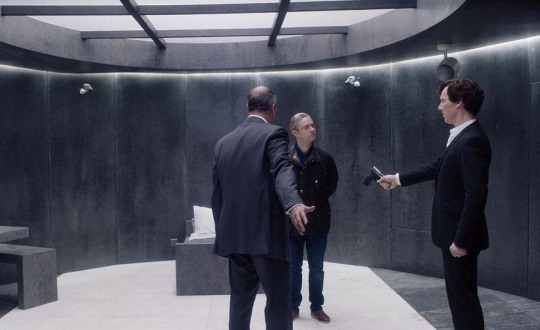
But what if the ‘rules’ are wrong? I think this mirrors how Sherlock, in a way, made John shoot the cabbie through the window in ASiP. If Sherlock had turned in the serial killer to the police instead of joining him to play mind games and prove himself clever, John wouldn’t have had to kill a person, which is a heavy weight to bear. In this scenario it gets clear that John doesn’t want to shoot someone, not even for the ‘greater good’. And in the end the Governor shoots himself to save his wife (who subsequently gets shot anyway). But the link to ASiP is clearly there, in my opinion; why else would they show us this bullet hole, which very much resembles the one where John shot the cabbie?
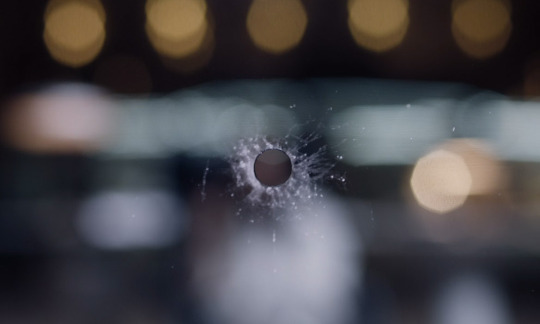
The next experiment is the three Garrideb brothers who are kept tied-up and dangling over the abyss. This is (supposedly) about solving a crime puzzle, and Sherlock quickly deduces who of the three brothers had committed the murder. But it doesn’t matter to Euros who the guilty is; she kills all three Garridebs anyway. Which resembles the result when Sherlock in TGG focuses a bit too much on the puzzles, without considering the victims (which enrages John). The blind lady had to spend a long time suffering in complete agony, so maybe she could no longer think clearly and started describing the criminal, who then detonated the bomb. Caring about the victim might have been an advantage for solving the case, and I think the important thing was that Sherlock’s cleverness wasn’t enough; the lady and a whole lot of other innocent people died anyway. But at least his compassion might have lessened the time of suffering for the victim. What would have happened if Sherlock had refused to condemn any of the Garridebs? We don’t know, because he thought he could save two of them by solving the puzzle and condemning the guilty one.
In the end it didn’t matter what Sherlock’s brain told him to do in these ‘experiments’; the victims died anyway. Which means caring about them at least wouldn’t have hurt. But I have a feeling that showing compassion in TGG would have solved much of the communication problems between Sherlock and John. Which I hope Sherlock finally begins to understand after TFP.
TFP, Scenario 3: What will happen if Sherlock confesses his love to John?
inspiration: I think this is one of Sherlock’s hardest tasks, because he has nothing to draw from. I think he knows - subconsciously - from TLD that he can’t bring John to ‘confess’ his feelings for Sherlock, unless Sherlock takes the first step. But having repressed his feelings for so long, this isn’t easy for Sherlock. He needs to learn to say the words, yes, but this isn’t enough; he has to actually mean it. Because if he tries to fool John in any way (like he cowardly did in the underground case in TEH), or slip away from it as in the Tarmac scene in HLV, it’s only going to hurt John further and destroy his trust. So that’s why I think Eurus (=Sherlock) sets up this experiment. He needs Molly as a mirror for John, because he isn’t ready to admit this to John’s face just yet.
[Running the scenario, involving a phone call to Molly with a threat of blowing her up if Sherlock can’t have a confession from her]
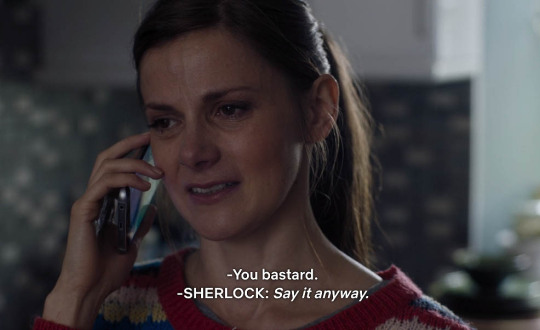
Result: It turns out that Molly (=John) won’t have any of this BS any more; it’s time for Sherlock to come clean.
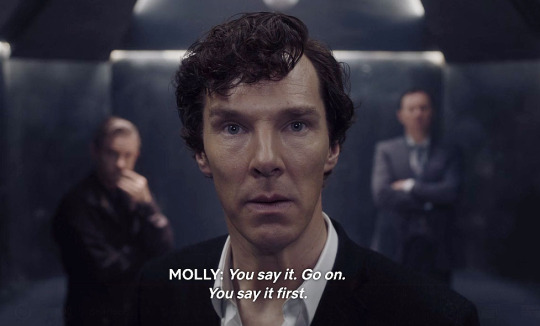
This is not about protecting John, or any other practical or ‘external’ reason for committing to him. It’s the point of no return, the moment of pure and simple honesty. “Tell John the truth” – that’s the mission. And finally, he does.
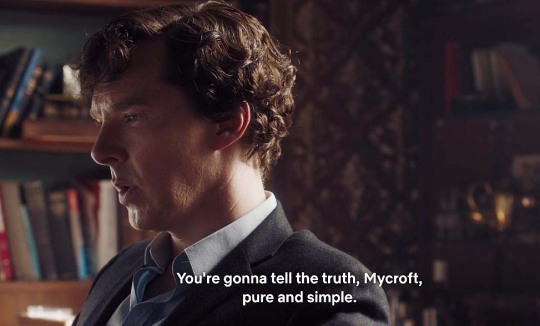
Discussion: This scenario is where I think the quote from Oscar Wilde might come in handy.
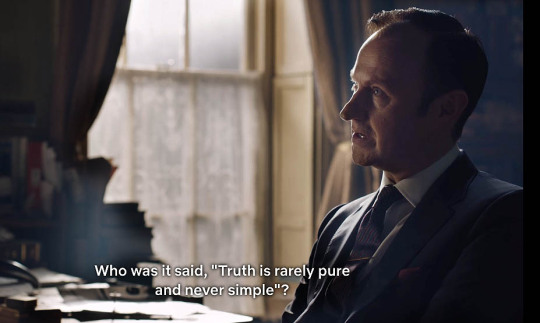
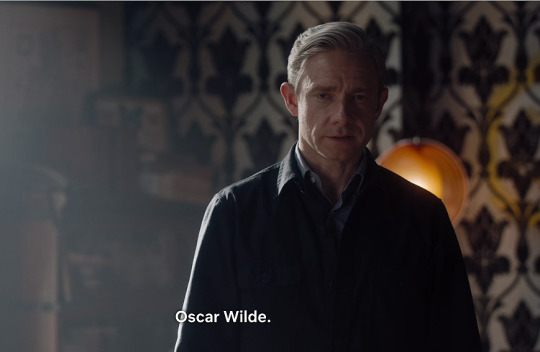
The title of the story that John, Mycroft and Sherlock are talking about is ‘The importance of being Earnest’. I’m not a native English speaker, but the word ‘earnest’ has several meanings, as far as I know. For example serious-minded, solemn, sober. But also heartfelt, sincere and impassioned. And Earnest is also the (false) name of the two protagonists in Wilde’s story, hence the wordplay in the title. In this work, Wilde is depicting two friends that keep lying about who they really are and what’s their real name, in order to escape social obligations. But the subtext is quite loud that this is rather about their relationship than the women they are (supposedly) courting.
The play premiered in London in 1895, the same year as Oscar Wilde was imprisoned and sentenced to two years of hard labour for “gross indecency” (= basically for being gay). And also the same year that has been re-hashed in this show since John’s blog got stuck on 1895 hits in ASiB.
Anyway, this scenario is a key point; it’s where I believe Sherlock finally breaks and starts allowing himself to feel and react emotionally. Sherlock sees 'I love you’ as a defeat and Eurus tells him that he has made more harm than good. But I think he’s on the right track now, because he’s letting himself feel.
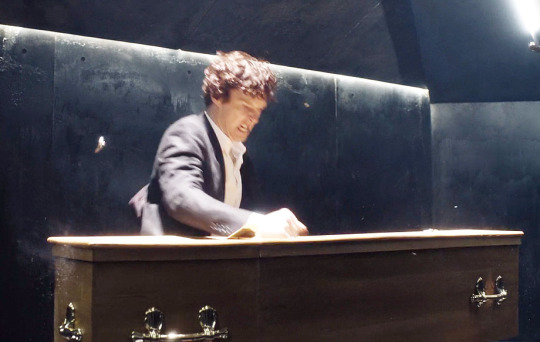
And smashing the coffin might mean that he has actually found the way to save John Watson. Save him from suicide, because that’s what I believe the coffin means, symbolically: the death of John.
TFP, Scenario 4: Heart or brain?
Inspiration: I’m not sure where exactly Sherlock draws from with this one, but this seems to be a nagging question that he has been wrestling with for some time now. In Eurus’ fourth experiment in Sherrinford, Sherlock still keeps playing the game on her terms, by accepting to choose between John and Mycroft; metaphorically heart vs brain. It seems like Sherlock has to either keep his brilliant brain and cut off his heart again, or go by his heart, which will make him lose his head and go insane.
[running the fourth model, involving a gun and a choice]
Result: For a moment, it looks like Sherlock is actually going to choose the heart option and shoot Mycroft, who tries to provoke him to do this. But Sherlock now - for the first time in this story - skips the game and goes for a third option instead: killing himself. Again. Which seems to very much be Moriarty’s (= homophobia’s) goal with this.
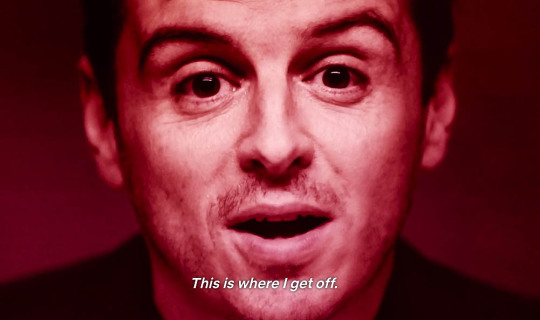
But it doesn’t work, because taking his own life is not the solution Eurus wants, so she doesn’t let him. Sherlock gets sedated, and his choice (to keep both brain and heart) only leads to another prison, where he’s surrounded by old family photos and a dog bowl (=memories). But breaking free from this and solving the Musgrave Ritual is (apparently) the solution.
Discussion: This choice could have been lengthy, but since Eurus (=Sherlock) aborts this scenario rather quickly, let’s just jump to the next one.
Scenario 5: How can Sherlock find the Truth?
The little girl on the plane, whom Sherlock has been trying to communicate with since early on in the episode, is lonely and desperate, and Sherlock is supposed to talk her down, to guide her towards the ground so she can land safely. But we also know that Mycroft (=Sherlock’s brain) was actually planning to let her crash the plane ‘for the greater good’ of other people’s safety.
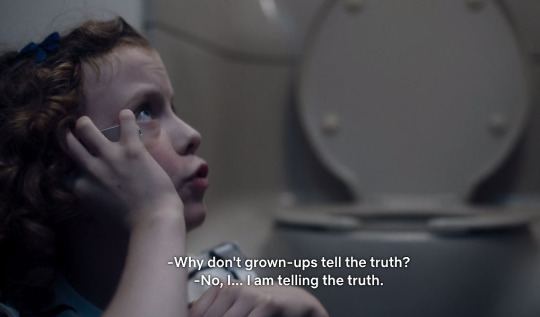
So, are you telling the truth, Sherlock? I’m not so sure about that actually... And did the grown-ups really tell you the truth about certain things when you were a kid? You do seem to doubt it.
Inspiration: Well, once again I suspect that Oscar Wilde might have been an inspiration for this experiment; “Truth is rarely pure and never simple”. But the girl on the plane might also be very much representing how Sherlock is feeling; he might have been withhold truth in his past, so he opted to seek for it himself, always, by using his brain and powers of deduction. But he feels alone and scared, up in his ‘ivory tower’.
[Running a scenario involving a puzzle based on Eurus’ song; is it the solution to this puzzle?]
Result: The little girl is, it turns out, actually Eurus (=Sherlock), who is feeling lost high up in the sky, unable to land with a sleeping driver. Finding Eurus’ “room” by solving the song puzzle means finding the truth. Which means Sherlock can finally save John from the well he’s drowning in.
Discussion: [Ironically enough, in the midst of all this (righteous) rage over the big ‘Purge’ of tumblr, I stumbled over something that I wonder if it’s not a double irony? Or a triple irony?
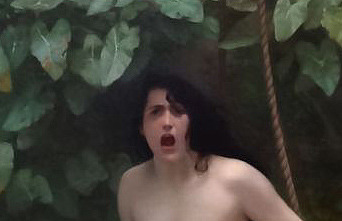
The thing is, that seeing this post about the tumblr censors flagging a 19:th century painting of the “Truth coming out of her well to shame mankind” (X), actually happened to give me something of an epiphany.]
This painting is from 1896 and it’s made by the French artist Jean-Léon Gérôme. You can read more about Gérôme’s work and see this and other of his paintings in this article here. This is the story (my bolding):
“At this time, Gérôme painted a series of works showing the personification of Truth. First, she was shown as a nude at the bottom of a well, either lying on the ground, or standing with a mirror in her hand.”
“Truth Coming out of her Well to Shame Mankind (1896) is based on a quotation from Democritus, “Of a truth we know nothing, for truth is in a well” (or, more literally, ‘in an abyss’), but knowing that reference is of little help in understanding these paintings. Gérôme had given one of the earlier paintings the title of Mendacibus et histrionibus occisa in puteo jacet alma Veritas, which translates as ‘The nurturer Truth lies in a well, having been killed by liars and actors’. In this last version, she has climbed out of the well, and instead of bearing the customary mirror, she brandishes a whip with which to scourge us.”
How many mirrors have we seen in this show by now? I think I lost count already in the unaired Pilot, but I wood guess at least some 50-ish. The point I want to make here, however, is that I believe the Truth Coming Out is central in BBC Sherlock. And in this fifth scenario we have two characters that are trapped in a well, keeping Truth hidden to the world:
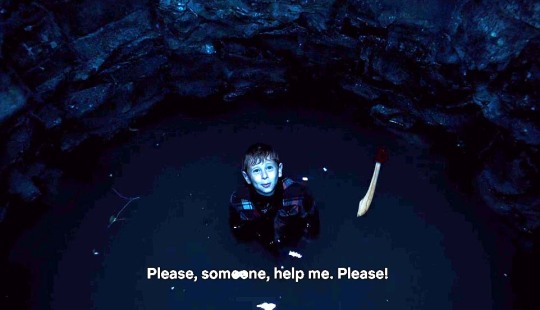
Young Victor Trevor (Sherlock’s mate from college in ACD canon)...
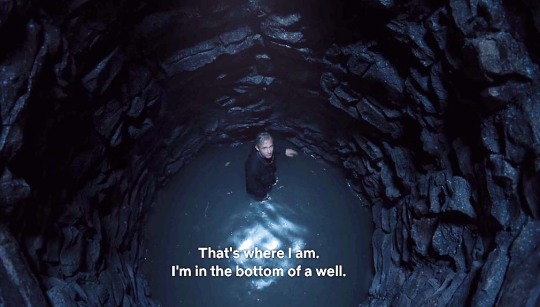
...and adult John Watson.
One of them never came out; he was ‘killed by liars and actors’, people who refused to see the Truth. So something might have happened with Victor, which contributed to Sherlock shutting down his emotions.
But the other one did come out, didn’t he?
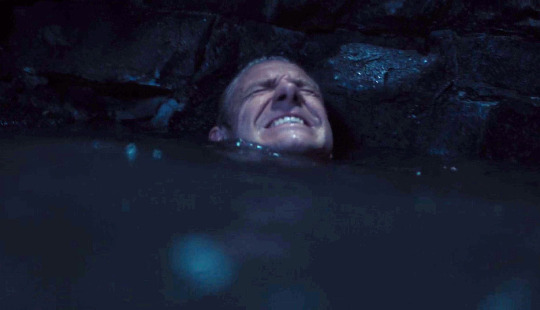
He literally did come out of his well, and he did it with Sherlock’s help. John isn’t exactly naked at the end of TFP, and he isn’t brandishing a whip (that’s Sherlock’s job - right? ;) ), so apparently John isn’t going to shame us. But John is indeed Sherlock’s Truth. If Sherlock is honest with himself, if he’s earnest, i think he must sooner or later admit exactly what John means to him. And John is wearing a blanket, just as Sherlock was after John Saved him in ASiP.
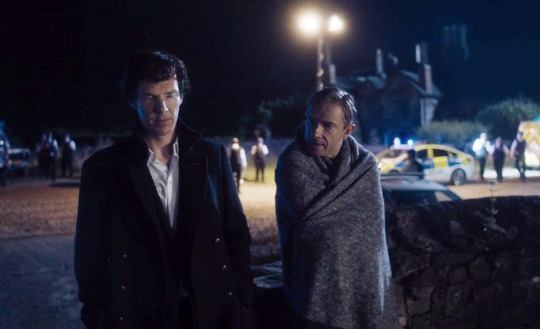
So if John is going to come out in S5, I think it’s perfectly foreshadowed here. And if he does, he’ll bring Truth with him, the true character of their relationship (which is also signaled by the codes of this episode). But it has to be with Sherlock’s help; Sherlock needs to take the first step to help him. This is the first time in S4 that Sherlock actually seems to manage to save John Watson. And he solves the puzzle by realizing that the girl on the plane is Eurus, who desperately needs a hug. Sherlock needs to embrace his own emotions, be OK with them and let them exist at the pair of his rational thinking.
Scenario #6: Does it matter who you really are?
Inspiration: A DVD is in focus here - not a memory stick this time - and it carries a message from ‘Mary’, just like the one at the end of TST, and the ‘unsolved’ (stabbed) case on Sherlock��s mantelpiece in TLD. But should Sherlock actually listen to her?
[The last scenario is a sort of ‘epilogue’ to the events in Sherrinford, where things seem to have ‘straightened up’ again.]
Result: After Musgrave, Eurus is locked up in Sherrinford again; apparently Sherlock still considers his emotional self as being too dangerous to let loose, and now she can’t even speak any more. But we also see Sherlock in a process of healing; he rebuilds 221B with the help of John, and he starts meeting Sister Sentiment regularly, communicating with her directly through the violin. And, as @loveismyrevolution commented here, the beautiful piece they are playing together is called “Who you really are”(X).
“What I try to say is that Sherlock’s emotions are that intense that they must be kept in charge and they are still locked within himself (Sherrinford), but he’s aware of them, is in contact with them, acknowledges them to the outside world and it makes him whole again”.
Discussion: 221B now has a slightly new dressing; some furniture have more rounded edges, and there’s an infant to take care of. Sherlock and John both seems happy with this. Both Greg and Molly pop in, and apparently Sherlock and John are solving crimes together again. But why is Mrs Hudson going around spraying the flat with aerosol?
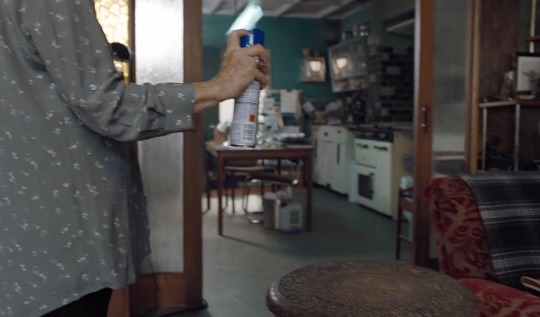
The last (and only) time we saw aerosol in this show was the poisonous, fear-inducing fog at Baskerville and Dewer’s Hollow in THoB. Does this mean that the poisonous homophobia is still around? (I’m going by the metaphors in @sagestreet‘s Follow-the-dog meta here, that the hallucinogenic fog in THoB represents homophobia). Well, to me it definitely seems so, since this important issue still isn’t addressed - far from it, actually. And what about Sherlock facing Death (=Appointment in Samara)? The skull on the wall still seems to be glowing in one of the dull colours it was displaying before 221B got blown up, and John still appears concerned:
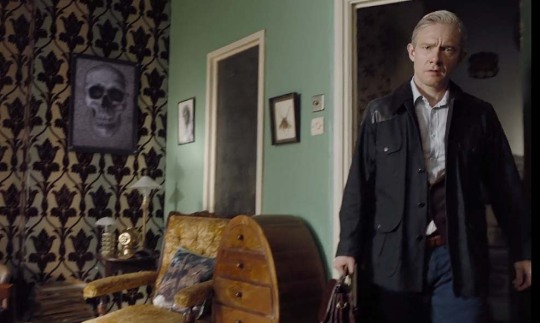
While I still believe, on both the meta level and as in-show ‘reality’, that the Holmes character is dying, at least Sherlock now seems to have faced his demons and thereby got in touch with his own, buried, emotions. But the scenario is very much dominated by ‘Mary’, whose message is two-edged:
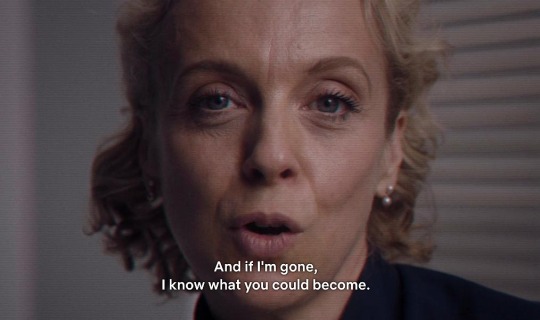
On the one hand she is hinting at what John and Sherlock could become without her. But on the other hand she claims that it doesn’t matter who they really are, and then she calls them “My Baker Street Boys”. Which I take to mean, that we could have our Holmes character two ways: Either we can keep it on a closeted, ‘myths-and-legends’ level as ‘Mary’ says, where Sherlock Holmes is an immortal, indestructible character. But if he can’t die, and he can’t fall in love, neither does he truly appear to be alive, right? The other option is that Sherlock and John need to get rid of her once and for all. Once 'Mary’s messages are no longer dominating, a time may come when Sherlock and John can become something very different from the emotionally repressed characters they remain until the end of this scenario, which has them frozen in time. They might actually come to life far more than in any adaptation this far. There’s a potential there, but also a threat. If it indeed matters ‘who you really are’, I believe this conflict has to be tackled in the next upcoming episodes.
OK, sorry for this meta-marathon, I hop it was at least barely readable. :) In the next installment I’ll analyse ‘Mary’s role more in-depth, trying to test predictions from this hypothesis:
Hypothesis #8. John is not the father of ‘Mary’s baby.
Tagging some people who might be interested: @raggedyblue @ebaeschnbliah @sarahthecoat @gosherlocked @loveismyrevolution @sagestreet @tjlcisthenewsexy @elldotsee @88thparallel @devoursjohnlock @sherlock-overflow-error
22 notes
·
View notes
Text
Learning to care for dying's forgotten
http://bit.ly/2A2xJ3z
Surviving friends and family of a person who dies often go through deep grief. Ker_vil/Shutterstock.com
In most U.S. medical schools, lessons about death naturally focus on the care of the dying patient. But there is another group of people to whom health professionals need to learn to attend: the dying patient’s family and friends. In nearly every case, mortality’s collateral damage reaches more widely and endures longer than the patient’s travails, which cease at the moment of death.
Our preoccupation with the dying patient is not difficult to understand. For one thing, medical students are taught to put the patient first, which means others come second. Moreover, revenues and quality measures in health care revolve around the patient. As a result, grieving family and friends may languish in neglect, particularly in the weeks and months after a patient has died.
Consider these words of the daughter of a deceased elderly patient I know. “The whole time Dad was in the intensive care unit, the doctors and nurses seemed more interested in the machines than in us. When they talked to us, it was always because a medical decision had to be made. They never asked us how we were doing. After Dad died, we never heard from them or the hospital again.”
Such complaints are not rare, in part because death is such a ubiquitous fact of daily life. About 2.6 million Americans die every year, which works out to an average of 7,200 deaths per day and 300 deaths per hour. If people were dying at home, health professionals might have little opportunity to care for the grieving, but 63 percent of Americans die in hospitals and another 17 percent in chronic care facilities.
To help health professionals in training learn to care effectively for the grieving, it is important first to help them understand what it is like to grapple with the loss of a loved one. Many students are too young to have known such losses themselves, which can make it difficult to see death from the point of view of those left behind.
The role of literature
In my teaching of students at the Indiana University School of Medicine, I have found that some of the most important lessons on the care of the grieving lie not in medical textbooks but in great works of literature. By enabling us to experience grief vicariously, literature can enrich our moral imaginations, enabling us to care more compassionately.
Anton Chekhov. Everett Historical/Shutterstock.com
One of literature’s greatest explorers of grief was the Russian writer, Anton Chekhov (1860-1904). He is typically ranked among the top playwrights in history, second only to Shakespeare, and he is equally highly regarded as a short story writer. Chekhov was not only a writer but also a practicing physician who cared for many dying patients over the course of his career.
In writing about death and loss, Chekhov knew his subject well, having grappled with the prospect of losing his own life and the deaths of loved ones. Just after completing medical school, he was diagnosed with the disease that would eventually take his life, tuberculosis. He also experienced a deep depression after the death of his brother Nikolay from the same disease in 1889.
Chekhov’s ‘Misery’
Grief can be especially hard when no one is there to listen. thatreec/Shutterstock.com
One of Chekhov’s masterworks is a 2,000-word gem entitled simply “Misery.” It tells the story of an old driver of a horse-drawn cab whose adult son has died just a week before. The cabbie wants “to tell how his son was taken ill, how he suffered, what he said before he died, how he died…He wants to describe the funeral…Yes, he has plenty to talk about.” But no one will listen.
Instead, the cabbie’s passengers think only of themselves. One hears the beginning of his story and asks what the son died of, but turns out to be preoccupied with his own affairs. His next fare, a trio of brazen young men, are so preoccupied by boasts of their revelry that they might as well be deaf, pausing only to berate the cabbie for driving too slowly.
In response to their complaints, the old man laments, “The only wife for me now is the damp earth… The grave that is!… Here my son’s dead and I am alive… It’s a strange thing, death has come in at the wrong door… Instead of coming for me it went for my son.” The contrast between the cabbie’s desolation and the carousers’ indifference heightens our appreciation for his melancholy.
In the end, the old man can find no one to talk to but his horse. “My son said good-bye to me… He went and died for no reason… Now, suppose you had a little colt, and you were mother to that little colt… And all at once that same little colt went and died… You’d be sorry, wouldn’t you?”
As the story concludes and the old man is carried away by his tale, the mare simply stands at his side, munching her hay.
Lessons for health professions students
The lessons for health professionals in training are unmistakable. Those of us who care for the dying must take care lest we become so preoccupied with our own affairs that we fail to hear what our patient’s loved ones need to tell us. We can get so distracted by the needs of the patient and the complex apparatus of contemporary care that we cease to attend to the grieving.
Like life itself, dying is better conceived as a journey than a destination, and it is an odyssey no less for the grieving than the deceased. The to-do lists of health professionals seem to be growing longer every year, and sometimes they loom so large in our field of view that we lose sight of those who need our care. Good literature reminds us not to mistake the record for the reality.
When students study Chekhov’s masterpiece for themselves, read it aloud to each other and take the time to plumb its depths in discussion, they gain a deeper appreciation for what it means for suffering human beings to carry around in their hearts an experience that they desperately need to share with someone else. Having felt it for themselves, the students can better recognize and respond to someone else in the same state.
Of course, health professionals are not the only ones capable of such compassion. Simply by virtue of our humanity, each of us shares the capacity to listen with genuine concern to the story of another human being in distress. We cannot undo this world’s misery, but each of us can lighten the load by serving as a sympathetic ear when the grieving need to share their stories.
Richard Gunderman does not work for, consult, own shares in or receive funding from any company or organisation that would benefit from this article, and has disclosed no relevant affiliations beyond their academic appointment.
0 notes
Text
Speech: Greg Clark speech at the opening of London Taxi Company’s new electric taxi factory has been published on Energy Solutions News
New Post has been published on http://www.energybrokers.co.uk/news/beis/speech-greg-clark-speech-at-the-opening-of-london-taxi-companys-new-electric-taxi-factory
Speech: Greg Clark speech at the opening of London Taxi Company’s new electric taxi factory
Introduction
Thank you, it’s a great honour to be here for the opening of such an impressive new factory.
50,000 square feet.
An annual production capacity of 20,000 vehicles.
Up to a thousand new jobs.
A £325 million investment in an icon of British culture.
Over the last 60 years, more than 130,000 London Black Cabs have been produced here in the West Midlands.
However, the history of motorised taxi manufacturing in the UK is twice as long as that.
The first purpose-built motorised taxi was manufactured in 1897 – and remarkably it was an electric vehicle.
Because of their bright livery and the sound of their engines, these were known as Hummingbirds – and, for a few years, were a familiar sight on the streets of London.
Sadly, the battery technology of the time could not compete against the petrol engine – and, in the 20th century, electric vehicles were pushed off the road.
However, in this century, we can expect the opposite to happen.
Indeed, we stand on the brink of a road transport revolution: a new age of ultra low emission vehicles that might just well save the world.
This factory is where a better future will be made, while at the same time continuing a great British tradition.
London black cabs not only keep our capital moving, but they help represent our country far and wide.
In 2013, that proud legacy was secured when the London Taxi Company was acquired by Geely.
And, now with vital investment from its parent company, LTC goes on to even greater things.
I’m delighted that the founder and chairman of Geely is with us today.
Li Shufu is one of China’s great business leaders – and, therefore, one of the world’s great business leaders.
Mr Li, on behalf of the Prime Minister and the whole Government, I would like to express our gratitude for your commitment to this company and also to our country.
I greatly look forward to our continued cooperation – and to strengthening the partnership between our nations.
Electric vehicles
Ladies and gentlemen, all relationships, all partnerships, are deepened through shared interests.
Trade is one such interest; another is the fight against climate change.
It is a global endeavour in which China is now playing a leading role.
Not least, in the contribution made by Chinese manufacturers.
By driving down the price of key technologies we are making possible a low carbon future in which energy is not only used efficiently but produced cleanly and cheaply.
Of course, to achieve our climate objectives we also need low carbon transportation – and for that we need low emission vehicles.
After a century in which the internal combustion engine has ruled the roads, we need to persuade consumers that a shift to electric engines and other forms of low emission vehicles is both desirable and achievable.
Electric vehicles must be seen as a reliable, mainstream option.
I can think of no better demonstration than the electrification of the taxi – and not just any taxi, but the London black cab.
Here we have the very image of tradition, comfort and reliability – and one that millions of Londoners, commuters and tourists can experience for themselves.
If people see black cabs go green then they will know that all cars can do the same.
It’s not just the evidence of their eyes that will count, but also the evidence of their lungs.
The global problem of climate change runs alongside the local problem of air pollution.
LTC has already shown it is possible to cut harmful emissions with better diesel engines.
And the vehicles produced in this factory will show that we can cut emissions altogether.
For busy cities, not just in this country but all around the world, that is truly welcome news.
So for all of these reasons the UK Government has identified the continuation of innovation in electric and other low emission vehicles as a key priority for our Industrial Strategy.
And that is why today we’re announcing today £50 million to encourage taxi drivers to switch to cleaner greener vehicles; cabbies here amongst us I’m sure will be pleased to know that there will be up to £7,500 off the price of a new cab and £14m worth of investment in dedicated charge point for electric taxis not just in London but in ten councils.
Ultimately, progress depends on the expertise and commitment of advanced automotive companies like LTC and Geely – but Government can play, and will, play an important supporting role.
Industrial strategy
Unlike the failed policies of the past, a modern industrial strategy does not mean government telling business what to do.
Rather it’s about public investments helping them support their own long-term investment decisions that companies are making.
For instance, Government can nourish the roots of innovation through our funding of science.
This country has many of the world’s top universities and research institutions – and we will maintain and extend this advantage.
That is why, last November, we announced the biggest increase in public research and development funding since 1979.
This will include funding for research that is of direct relevance to the automotive sector – for instance, research into better batteries.
Skills provision is another area in which the government can play a vital role.
If we want British industry to manufacture the next generation of products, then we must nurture the next generation of engineers, mechanics and designers.
We are determined to build on our strengths and to build a system of technical education that can beat any in the world.
And we will continue to invest not just in the quantity but the quality of apprenticeships – of which the training schemes offered by LTC are an excellent example.
We are providing the funds required to achieve these goals – with the Spring Budget described by the Confederation of British Industry as “a breakthrough budget for skills.”
Infrastructure is focus of further action.
We’ve given the go-ahead to a string of major upgrades.
We can’t expect industry to make long-term investment decisions if the government refuses to do the same, which is why we are determined to make these big decisions as part of our Industrial Strategy.
The automotive sector
Just as important as the scale and seriousness of public investment is the care by which it is coordinated.
This requires that decisions are made at the right level and through the right institutions.
For example, to support our diverse local economies we need to empower local decision makers.
That’s why, as part of devolving power from Whitehall, we’ve created local institutions capable of using it – such as the Coventry and Warwickshire Local Enterprise Partnership which continues to be such a big champion of the development of advanced manufacturing in this area.
This £325 million investment was supported by a £16 million investment through the Regional Growth Fund.
In other cases, the most appropriate context for decision making is not geographical, but sectoral.
By creating its own shared institutions, each sector can play an active role in the development of industrial policy – working not just for the benefit of a few incumbents that exist already but for the whole sector including the supply chain.
In this respect the UK automotive sector serves as a beacon of success.
Sector-wide institutions like the Automotive Council and the Advanced Propulsion Centre have played a pivotal role in the coordination of public investment as well as private investment – whether in research, skills or the other foundations of productivity.
Today, our UK automotive sector is the most productive in Europe – a testament to what can be achieved.
A testament also to the benefits of inward investment.
Back in the 1970s, car making in the UK had become emblematic of our post-war decline – but, through partnership with overseas manufacturers, as well as domestic ones, the industry was transformed.
From the North East to the West Midlands advanced automotive engineering and cutting edge vehicle design is a key strength of the modern British economy.
And today, we open the latest compelling chapter in this story of success.
A story in which this Government is proud to play a supporting, but steadfast, role.
It is an honour and a privilege to be with you today at this most auspicious event.
0 notes